#Emergency Gazette
Explore tagged Tumblr posts
Text
For International 'Zine Month: On Some Close-to-Home Theatre 'Zines
July is International ‘Zine Month! The occasion has inspired a little navel gazing, for in those dim dark days before blogging was available, ‘zines were the only way many of us could self-publish with total freedom, and I myself plunged into that wonderful madness for a time. And like anything else, it has a history. There will be some of you who already don’t know what I’m talking about.…
#&039;zines#alternative#Ayun Halliday#David Cote#East Village Inky#Emergency Gazette#Herald of Freedom#indie#International &039;Zine Month#John Devore#off#off-off Broadway#theatre#Yelena Gluzman
3 notes
·
View notes
Text

#ah ruki finally you emerged!!#it feels so good that he finally posted something#I've honestly been so worried#of course I understand that he needed his time#and most likely still does#but still#I needed him to update at least _something_#<3#ruki#ruki the gazette#the gazette#yes yes this is only google translate#but it's at least something#trans: twitter
67 notes
·
View notes
Text
So many fucking tornados this month god damn I am tired of this
#go get your tetanus booster if youre gonna volunteer to help with cleanup#theyre usually free from emergency response#bonehead gazette
0 notes
Text
"In short: Thailand's Senate has approved a bill legalising same sex marriage in the South-East Asian country.
It will afford same-sex couples practical benefits such as being able to have children through IVF and make emergency medical decisions for their spouse.
What's next? The first weddings may take place later this year, 120 days after the law is announced in the Royal Gazette.
Thailand has become the first nation in South-East Asia to legalise same sex marriage, with the country's Senate approving the landmark bill this afternoon.
The legislation was expected to pass after it cleared the country's House of Representatives in a near-unanimous vote in March.
Despite Thailand's bustling gay bars and prominent transgender community making it a mecca for LGBTQ+ tourists, until now local same-sex couples there have been unable to marry.
The law will take effect 120 days after its announcement in the Royal Gazette, so the first same sex weddings may take place later this year.
Couples who have been waiting years have hailed the move as a historic moment that will afford them rights only reserved for spouses.
A Lifechanging Law
Photos of Anticha and Worawan [including the article picture], dressed in floor-length white gowns and trailed by rainbow flags, getting married at Bangkok's first Pride Festival two years ago went viral, but they are still not legally married.
Now they will be able to change that, and Anticha Sangchai is elated.
"This will change my life and change many Thai people's lives, especially in the LGBT community," she said.
"It is a historical moment and I really want to join with my community to celebrate this moment.
"I want to send a message to the world that Thailand has changed. Even though there are still many issues, this is a big step for us." ...
There were an estimated 3.7 million LGBT people in Thailand in 2022, according to LGBT Capital, a private company which models economic data pertaining to the community around the world.
For the young couple from Bangkok, being able to marry also has very real practical implications.
If they want to have children through IVF, Ms Sangchai says they will need a marriage certificate first.
"I am quite concerned about the time because we are getting older every day, and the older you get the more difficult it is to have a healthy pregnancy," she said.
"So we've been really wanting this law to pass as soon as possible."
Cabaret performer Jena is excited Thailand's laws are finally catching up with the nation's image...
She too had worried about the practical implications of being unable to marry.
"For example, if myself or my partner had to go to hospital or there was an accident that needs consent for an emergency operation, without a marriage certificate we couldn't sign it," she said.
She now wants the government to move forward with a law to allow transgender people to amend their gender on official documents." ...
An Economic Boost?
Thailand has long been famous for LGBTQ tourism and there are now hopes this new law could allow the country to cash in on the aging members of the community.
Chaiwat Songsiriphan, who runs a health clinic for people in the LGBTQ community, said laws preventing same sex marriage were the last barrier holding the country back from becoming a gay retirement hub.
[Note: They do not just mean for rich westerners; Thailand as a gay retirement hub would probably appeal most to and definitely benefit LGBTQ people from throughout Asia.]
"Thailand has an LGBTQ-friendly environment since Thai culture is quite flexible," he said.
"One of my foreigner friends, a gay friend, told me that when he's in his country he has to pretend to be straight … but when he comes to Bangkok he said you can be as gay as you want.
"When we talk about retirement or a long-term stay for the rest of their lives, what people need is … food, good healthcare services, transportation, homes.
"I think Thailand has it all at a very affordable price."
He said it could help give the country a desperately needed economic boost.
"This will have a lot of benefits for Thailand's economy because when we talk about retirement it's people literally bringing all the money they have earned for the rest of their working lives to spend and invest here," he said.
He said he, like the rest of the community, was thrilled by the news.
"It's not about a privilege, it's just equality," he said.
"We are we also humans, so we should be able to marry the one we love.""
-via ABC Australia, June 18, 2024
#thailand#bangkok#thai#thai culture#southeast asia#marriage equality#gay marriage#gay rights#lgbtq rights#queer rights#ivf#weddings#gay wedding#good news#hope
2K notes
·
View notes
Text
Religiously

Summary: Jake’s world is turned upside down when he learns that the woman he once loved is getting married to someone else. Struggling with the weight of his past mistakes and the emotional fallout of their breakup, Jake is deployed on a mission that nearly costs him his life. What happens when he returns home to recover from his injuries and comes face to face with her?
Pairing: Jake "Hangman" Seresin x Reader (No Use of Y/n)
Warnings: Mild Language, Mild Religious References, Violence related to military action and combat, Combat Related Injury, Mentions of near death experiences, Discussions of emotional and physical pain, PTSD like themes, Possible triggers related to medical and emergency situations.
Word Count: 6,664
A/N: So it's been a little bit since I posted anything. But here is a little something I've been working on for a few days. Hope you guys enjoy xx
**Flashbacks ared indicated by italics**
Jake shifted the phone to his other ear, stretching his legs out on the hard, thin standard issue mattress that the Navy offered in the barracks. The air conditioning unit rattled in the background, barely cutting through the Southern California heat.
It was late, and he was tired. But he knew he couldn’t miss his usual Sunday night call with his mom. No matter where the Navy sent him, Mama Seresin always expected him to check in.
“Your dad finally fixed the fence,” his mom was saying. “After I reminded him for the hundredth time.”
Jake smirked, rubbing a hand over his face. “Took him long enough.”
“That’s what I said, honey! But you know how he is. Stubborn as a mule.”
“Guess I know where I get it from, then.”
His mom scoffed. “Oh honey, that’s all from your daddy’s side.”
Jake chuckled, the familiar back and forth easing some of the tension in his chest. These calls were a tether to home. Something steady in a life that seemed to never stop moving.
But then his mom’s tone shifted, just slightly. “Oh, did you see the picture of the paper? Your sister said she was going to send it to you.”
Jake frowned. “What paper?”
“The Gazette. They had an engagement announcement in last week’s edition.”
He didn’t think much of it at first, just let her words settle in the background as he reached for the beer on the nightstand.
And then she said your name.
Jake’s fingers froze around the bottle. His heart punched once, hard, against his ribs.
“She’s getting married next month. Can you believe it?”
His throat suddenly felt tight and dry. He swallowed hard, trying to keep his voice even. “Yeah?”
“Mmhmm. Big wedding from what I hear. Out at that fancy vineyard in Hill Country. Her mama must be over the moon.”
Jake could only nod, even though she couldn’t see him.
You. Married.
He should’ve expected it. It had been years since he’d last seen you, since he’d walked away and let you go. But still, something about it didn’t sit right.
“Anyway, I always thought you two would end up together,” his mom added casually. Like she hadn’t just knocked the wind out of him. “Guess life had other plans.”
Jake let out a breath through his nose, gripping the bottle tighter. “Yeah. Guess so.”
A silence stretched between them, heavy with everything he didn’t say.
“Jake?” His mom’s voice softened. “You okay, sweetie?”
He cleared his throat. “Yeah, I’m good.”
“You sure, honey?” his mom pressed. “You sound—”
“I’m good, Ma,” he cut in, his voice rougher than he meant it to be. He ran a hand over his face. “Just tired. Long day.”
His mom didn’t push, but he could hear the doubt in the way she sighed. “Alright, well, get some rest. And call me next Sunday, you hear?”
“Yeah. Love you.”
“Love you too, baby.”
The call ended with a soft click, but the silence it left behind was anything but peaceful.
Jake let the phone rest against his chest for a second, staring up at the ceiling. The AC hummed steady but weak, barely making a dent in the sticky air.
He shut his eyes. Tried to push the thought of you out of his head. Tried to forget the way your name had felt like a punch to the ribs. Tried not to picture you in a white dress, smiling at some other man.
Jake sat up abruptly, cursing under his breath. He ran a hand through his hair, restless. His pulse was too loud, his thoughts running too fast.
He told himself to leave it alone. To let it go, the way he had years ago.
But his fingers moved before he could stop them, unlocking his phone and pulling up his photos. He scrolled fast, past images of deployments, blurry bar nights, old squadmates.
Until he sees it. A picture of you.
The two of you, tangled together on the dock that summer. Your legs draped over his, your head tipped back in laughter. The setting sun had turned your skin golden, your hair wind-tousled and perfect. He remembered the exact moment he took the photo.
“You’re staring,” you’d teased, nudging his arm.
“Maybe,” he’d admitted, grinning. “Can you blame me?”
Jake swallowed hard. His thumb hovered over the screen. He should put the phone down. Delete the photos. Move on.
But instead, his mind pulled him under. Back to that summer. Back to you. Back to the moment everything changed.
Jake kept scrolling. Past the dock. Past the bonfires. Past the blurry, stolen moments that still felt too sharp.
And then he stopped. The picture filled his screen, pulling the air straight from his lungs.
You, standing in the middle of the river, the water lapping at your thighs. Your arms stretched out, face tipped to the sun, eyes closed like you could soak in the warmth forever. That stupid blue swimsuit he used to tease you about, the one you insisted was your favorite.
He could still hear your laugh from that day.
Could still feel the moment everything changed.
“You coming in, or what?” you called, twisting toward him, your hair dripping down your back.
Jake sat on the riverbank, forearms resting on his knees, watching you wade deeper into the water. “I don’t know. You sure it’s not freezing?”
You rolled your eyes. “It’s Texas in July, dumbass.”
Still he didn’t move. Just sat there, watching the sunlight catch in your hair, the way the water curved around your legs.
You sighed, dramatically, and turned to face him fully. “Okay, fine. I’ll come to you.”
Before he could react, you lunged forward, hands cutting through the water, sending a wave straight at him.
“Damn it—”
It was too late. Cold water splashed over his legs, soaking the edge of his shorts.
Your laugh was loud and reckless. “Guess it’s not that cold, huh?”
Jake shot to his feet. “Oh, you’re real funny.”
“I try,” you quipped, grinning as you stepped back, deeper into the river. “What’re you gonna do about it?”
He didn’t think—just moved. Sprinting forward, he hit the water fast, the shock of it stealing his breath, but he didn’t stop. You yelped, spinning to escape, but he caught you easily, his arms wrapping around your waist.
“Jake. Don’t you dare—”
Too late.
He lifted you effortlessly, slinging you over his shoulder before spinning in a circle. You shrieked, kicking your legs, but he only laughed.
“Apologize,” he teased, tightening his grip.
“Never.”
“Suit yourself.”
And then he dropped you. You disappeared beneath the surface, the splash soaking him completely. He barely had a second to gloat before you popped up, hair plastered to your face, eyes blazing with mock outrage.
“Oh, it’s on,” you warned.
Before he could react, you launched yourself at him, pushing him under.
He surfaced a second later, shaking water from his face, only to find you already laughing.
You looked happy. You always looked happy, but today there was something different about it. About you.
Jake’s breath caught, something unfamiliar curling in his chest. He wanted to keep you like this. Wanted to see you like this every damn day.
And that’s when it hit him. Like a punch to the ribs.
He was falling for you. Maybe he already had.
Jake blinked, the memory dissolving like mist.
His chest ached, his grip tightening around the phone.
He should’ve told you. He should’ve said those three little words that summer.
But he never did. And now? Now you were marrying someone else.
Jake exhaled sharply and closed out of his photo album. Before he could think better of it, his fingers moved on instinct, opening his social media app and typing your name into the search bar.
The first picture hit him like a gut punch.
You standing in front of a wall of pastel balloons, champagne glass in hand. The caption read Bride to Be in swirly gold script, matching the sash draped over your shoulder. Someone had tagged you in the post a few weeks ago
Jake swallowed hard, his eyes dragging over the details.
The white dress clung to you in all the right ways. Your hair was curled soft around your face, your smile wide and effortless.
You looked happy. Really happy.
The sight of it made him sick.
His stomach twisted as he swiped through more photos. You, laughing with friends. You cutting into a cake shaped like a wedding dress. You leaning into your fiancé..
Jake’s jaw locked at the sight of the guy.
He looked…fine. Some clean cut, polished type. A little too put together. A little too perfect.
Your smiles with your fiance were poised and practiced. Pretty but forced. The kind of smile you put on when you knew a camera was on you. It was the kind of smile that didn’t quite reach your eyes.
Jake scrolled back to one of your old pictures together. A blurry shot from a summer night. You were sitting beside him on the tailgate of his truck. Your head was thrown back in laughter. No perfect angles. No careful posing. Just you, caught mid laugh, so lost in the moment you didn’t care about the camera.
And maybe Jake was just torturing himself, but he swore you looked happier then. Happier with him.
He scrolled back up, staring at the image of you in white at the bridal shower. Maybe you smiled like that now. Maybe you convinced yourself this was what you wanted.
Jake exhaled sharply and shut off his phone, dropping it onto the bed beside him like it burned. But the image of you in white was already seared into his mind.
Marriage. It was what you always wanted. Hell, he wanted it too…just not as soon as you. He told himself he wasn’t ready. That he needed more time, that he had things to figure out, that forever could wait a little longer.
But you weren’t willing to wait for him to decide that he was ready. And now time was up.
His jaw clenched. He ran a hand over his face, dragging it down to his mouth as if that could stop the ache clawing at his chest.
He should be over this by now. You were.
He stared at the ceiling, willing himself not to care.
It had been a couple of years. He’d had his share of short lived relationships, other break ups. He went through the motions. First dates, good mornings, empty conversations that never quite filled the space you left behind. Some hurt for a while, some didn’t even register, most faded into nothing more than a name or a fleeting memory.
But yours? That breakup was different. It wasn’t just another failed relationship. Yours was the one that gutted him. The one that still sat heavy in his chest, refusing to be buried no matter how much time passed.
It was the only one that still got to him. He could barely remember the details of his other breakups. Who ended things first, the reasons why, the words exchanged. They were all just echoes of something that was never meant to last.
But you? He remembered everything.
"I love you, Jake. I love you so much, but I can’t keep waiting for you to decide if you want this...if you want me."
Your eyes had been glassy, your hands clenched into fists at your sides like you were holding yourself together by sheer will alone. He’d stood there, jaw tight, arms crossed, refusing to let himself break. Refusing to admit he was terrified.
"It’s not that simple," he had said, voice rough, exhausted from the same argument you’d been having for weeks.
"It is for me," you whispered, voice cracking. "I want a life with you. A future. A family. But if you don’t know if you want that with me, then I—" You sucked in a sharp breath. "Then I can’t do this anymore."
The way your fingers trembled as you slipped the key to his place onto the counter nearly undid him. It was such a small movement, so quiet, but it hit like a gunshot. Final. Permanent.
Even then, even when you turned to go, he could have stopped you. He could have said Wait. I love you. I want this. I want you. But his own stubborn silence kept him frozen, hands fisting at his sides as he watched you walk to the door.
And everything in him screamed that he should run after you.
But he didn’t. And that was the moment he lost you.
And now, years later, the weight of losing you hadn’t lessened. If anything, it pressed down harder, knowing you’d moved on while he was still stuck here trying to pretend he wasn’t.
Jake’s thumb hovered over the screen as he scrolled, then stopped. A picture of you with a guitar.
You were sitting on a blanket in the grass, laughing at something just outside the frame, fingers curled around the neck of the instrument like it was second nature. The sight of it pulled at something deep in his chest. And just like that, he was back there.
Back on your front porch that summer night.
The cicadas hummed in the background, a lazy breeze rolling through, carrying the scent of honeysuckle and warm earth. You sat cross legged on the old wooden swing, your guitar balanced on your lap, the porch light casting a soft glow over your face.
"Come on, Jake," you teased, strumming a few easy chords. "You know this one."
He grinned, leaning against the railing with a beer dangling from his fingers. "I know it, but I’m not singing it."
"Fine," you huffed dramatically, but there was a smile playing on your lips. "Guess I’ll just have to sing it for both of us."
Your voice, soft and sweet, wrapped around the melody, carrying the words into the warm night air. And Jake just watched you. The way your fingers danced effortlessly over the strings. The way your nose scrunched slightly when you hit the higher notes. The way your eyes flicked up to meet his like you were singing just for him.
And that was the moment.
That was the moment he knew, or at least thought he knew, that he was going to marry you.
It hit him so fast, so unexpectedly, that it nearly knocked the breath out of him. He’d never believed in fate or soulmates or any of that, but sitting there, listening to you play your song under the Texas sky, he’d never been so sure of anything in his life.
But that was a lifetime ago.
And now, that life the one he thought he’d have with you, belonged to someone else.
Tomorrow he was leaving for deployment. Another stretch of time spent oceans away, filling his days with routine and responsibility. Pushing everything else, everything going on in his personal life to the back of his mind.
That was usually the easy part. But this time?
This time, he wished you were here. He wished you were the one standing by giving him that last lingering hug before he boarded the plane. The one pressing a kiss to his lips and telling him to stay safe, to come home in one piece. You used to say it with a teasing smile, but he knew you meant it with every part of you.
And if he was being honest with himself, if he let himself sink into that dangerous, aching place in his chest, he wished you’d be the one waiting for him when he came home too.
But he knew better than that. By the time he came back, you’d be someone else’s. You’d moved on. You’d found what you needed with someone who didn’t keep you waiting for him to be ready.
And tomorrow, as he stood on the tarmac, duffel slung over his shoulder, staring out at the horizon before takeoff…he’d have to find a way to make peace with that.
* * * * *
The days leading up to the mission had felt like any other. Straightforward. Jake had been briefed, run the practice drills. He knew the routine, knew the threats, knew the risks. But he wasn’t worried. He’d been through this before. He was trained for moments like this. His crew made up of Phoenix and Bob had his back, and he trusted them.
It wasn’t a difficult mission. Two planes. Simple intel. Minor threat from enemy aircraft, but it wasn’t a serious risk. That’s what they had been told, and Jake believed it.
They took off that morning, the cool January air crisp as the planes cut through it. Jake was leading, flying in formation with Phoenix and Bob close behind. The adrenaline buzzed in his veins, but he kept it steady. They had their plan, and nothing was going to go wrong. Or so he thought.
The radio crackled in his ear, Phoenix's voice cutting through the static. "Enemy aircraft, five o’clock!"
Jake didn’t see them. Not at first. Everything was too smooth, too easy. But as Phoenix and Bob called it out, the world shifted. He glanced over his shoulder just as a shadow broke through the cloud cover.
Before he could react, there was a burst of red hot fire tearing through his right wing. The impact hit like a freight train, and then… everything went wrong. His plane jolted violently, and the warning lights flashed in his cockpit.
"Shit!" Jake muttered under his breath, fighting for control.
His heart pounded in his chest as he scanned the sky. Phoenix and Bob were calling over the radio shouting commands, but everything was a blur of panic and noise.
The next thing he knew, the plane was spiraling, falling. And then came the gut wrenching sound of metal meeting the surface as his plane hit the water.
It was cold, too cold.
His body hit the surface with an intensity that felt like concrete.
Pain exploded in his chest, knocking the wind out of him, the world spinning around him as his plane began to sank. He struggled to keep his head above water. The saltwater burned against his skin, but it was the cold that was most unforgiving.
His breath came in shallow gasps. He could barely keep his eyes open. The pain radiated through every nerve in his body, but his thoughts didn’t linger on the physical agony.
All he could think about was you.
Your face, your laugh, the way you smiled at him like you were the only two people in the world. The warmth of your touch when he held you close. The way your eyes sparkled in the light.
God, he missed you.
It didn’t even feel like life anymore. The sun was still shining above, but it was too bright, too distant.
For a moment, Jake wondered if this was what death felt like. If the coldness of the ocean would be the last thing he ever felt.
He was there drifting, and staring up at the sky, each passing second slipping further and further from him. The world was fading. He wasn’t sure if it was the water filling his lungs or the weight of the loss that was dragging him down.
And then, in that haze of fading consciousness, a single thought pierced through the fog.
He would never see you again.
The pain from the crash didn’t compare to the ache in his chest at that thought. The empty, hollow feeling that consumed him, knowing he’d never get another chance to hold you, to tell you he loved you, to fix the mess he made.
His eyes closed again, the memory fading as darkness closed in, but not before he whispered one last time, "I love you."
Jake didn’t know how much time had passed. But suddenly the world around Jake was nothing but noise and shadows, a blur of voices he couldn’t quite make sense of. His body felt like a weight, every inch of him burning with pain, yet somehow, it was as if his mind was disconnected, floating somewhere far away.
He was still in the water. The coldness had a grip on him, sinking into his bones, but now... now there was warmth, a sensation that almost didn’t feel real. He blinked slowly, the light above him flickering, and then it was the sound of helicopters. The deep, reverberating thrum of blades slicing through the sky.
“Lieutenant Seresin!” a voice called, familiar yet distant. “Stay with me.”
He couldn’t focus on who was speaking, but the words reached him, distant echoes that seemed to tug him back from the abyss.
He heard his call sign then, as if it was the only thing tethering him to the world: “Hangman...Hangman, we’ve got you.”
A sharp pain ran through his body, and he hissed in response. His eyes tried to focus, but the world kept shifting, pulling him further under, as if the ocean itself was calling him back.
“Hang in there, Hangman!” another voice barked, this one more frantic. “We’ve got you. Just hold on.”
But he couldn’t hold on. He couldn’t keep his grip on consciousness. His eyes closed again, darkness threatening to take over.
And in that quiet, fleeting moment before everything faded, one thought echoed in his mind, louder than any of the voices around him, louder than the chopper blades, louder than the pain.
One name.
Your name.
The sound of your name coming from his lips was barely audible. But the weight of it was everything. It was the only thing his heart could hold onto.
The darkness began to press in around him yet again. But the voices around him wouldn’t let him go.
“Hangman, come on. You’ve got to stay with us.” Someone urged, and Jake could feel the pressure of someone's hands on his chest. He could tell he was being moved.
But even as he was pulled away from the brink of death, all he could think about was you. And the painful truth that you weren’t there. You weren’t going to be there waiting for him if he woke up.
* * * * *
The steady beeping of a heart monitor was the first thing Jake registered as he drifted back to consciousness. He blinked against the bright overhead light, his vision adjusting to the sterile white walls of a hospital room. His body felt heavy, weighed down by pain and exhaustion, but he was alive.
Alive. The word should’ve meant something. Should’ve felt like a victory. But all he felt was numb.
He didn’t know how long he lay there staring at the ceiling, letting the reality of everything settle in. The mission. The hit. The cold. The pain. The fact that he should be dead, but somehow wasn’t.
And you. You had been the last thing on his mind before he hit the water. The last thing before everything faded.
And now lying here alive when he shouldn’t be, he didn’t know what to do with that.
* * * * *
Jake stepped off the plane, the humid Texas air wrapping around him like an old familiar embrace. The warmth should’ve felt like home, but it didn’t. Not really. Maybe nothing would after everything.
His ribs ached from the long flight, but he ignored it as he grabbed his duffel bag and made his way through the small Austin airport. His mom was waiting for him near baggage claim, standing on her toes to scan the crowd. The second she spotted him, relief softened her face, and she rushed forward, pulling him into a tight hug.
"Jake," she breathed, her voice thick with emotion. "Oh, honey, it's so good to see you."
He gritted his teeth against the pain of her embrace but didn’t pull away. "Good to see you too, Mama."
She held him for a moment longer before stepping back, her hands lingering on his arms like she was afraid he’d disappear if she let go. Her eyes scanned his face, taking in the bruises, the exhaustion still clinging to him. "You look tired."
"Yeah, well. Almost dying will do that to a guy."
She swatted his arm lightly. "Don’t joke about that."
He gave her a tired smirk, but it didn’t quite reach his eyes. "Not joking."
Her expression faltered for a second, like she wanted to say something else, but instead, she just squeezed his arm. "Come on. Let’s get you home."
The drive back to the house was quiet, save for the occasional updates from his mom about family, neighbors, the latest town gossip. But Jake wasn’t really listening. He just stared out the window, watching the familiar Texas landscape roll past.
When they pulled into the driveway, his mom turned off the engine but didn’t get out right away. Instead, she looked at him carefully, her hands still gripping the wheel.
"You settling in okay?" she asked.
He frowned. "I just got here."
She nodded slowly, her lips pressing together like she was debating saying something else.
"What?" Jake asked, narrowing his eyes.
His mom hesitated, then gave him a small, knowing smile. "Nothing. Just…I have a feeling you're gonna find your time home a little more interesting than you expected."
Jake’s stomach twisted, but before he could ask what the hell that was supposed to mean, she grabbed her purse and stepped out of the car, leaving him sitting there, wondering why the hell she suddenly looked like she knew something he didn’t.
The next morning, the house was quiet. His parents had already left for work, leaving Jake alone with nothing but the old family dog and his own thoughts. He sat on the porch, the Texas sun warming his skin, a coffee cup resting on the arm of the wooden chair beside him.
His ribs still ached with every breath, and even the smallest movements sent sharp reminders through his body. But the worst pain wasn’t physical.
Beau, the aging golden retriever, lay at his feet, tail thumping lazily against the wooden planks as Jake absently scratched behind his ears. The dog was content. Jake wished he could say the same.
He leaned back, closing his eyes, listening to the rustle of the wind through the trees. It was peaceful, but peace didn’t reach him the way it used to. Not with everything in his head. Not with everything in his chest.
Then he heard it. Gravel crunching under tires.
His brows pulled together as he opened his eyes, turning his head toward the driveway. A car he didn’t recognize was pulling in. His stomach tightened, his mind automatically running through the possibilities. Maybe it was a neighbor. Maybe someone looking for his mom or dad.
Then the driver’s side door opened. And you stepped out.
Jake’s entire body went still. For a second, he wondered if the pain meds were making him hallucinate. Because there was no way you were here. No way you were standing in his parents’ driveway, looking exactly the same and somehow completely different all at once.
His pulse roared in his ears, drowning out everything else.
You shut the car door gently, standing there for a beat, like you weren’t sure if you should take another step.
Jake swallowed, but his throat was dry.
You take a slow step forward. Then another. The crunch of your shoes against the gravel is the only sound between you. Beau lifts his head, watching you curiously, but Jake didn’t move. He just watches you come closer, like he isn’t sure if you’re real or if you’ll disappear before you reach him.
And then you stop at the edge of the porch. Close enough that he can see every flicker of hesitation in your eyes. Close enough that he can tell you’re nervous.
Neither of you speak at first. You just look at each other. For a moment, it feels like the whole world holds its breath.
Then you break the silence. "How are you?"
Jake almost lies. The words 'I’m fine' sit on the tip of his tongue, easy and automatic. But when he looks at you—really looks at you—he can’t bring himself to say it.
Instead he exhales, shifts slightly in his seat, and admits, "Everything hurts like hell."
Your lips press together, your gaze flickering down, and for a second, he wonders if he shouldn’t have said that. If maybe you didn’t want to hear the truth.
Then you go quiet. Your fingers fidget at your sides, like you’re debating something.
Jake watches you, waiting. And then, finally, you lift your gaze and say softly, "I was scared when I got the call."
His brow furrows slightly. "What?"
You let out a breath, shifting on your feet. "They…couldn’t get ahold of your mom after the accident. And I guess..." You hesitate. "I guess I was still listed as a contact on your paperwork."
Jake's stomach tightens.
"They called you?" His voice is quieter now.
You nod. "Yeah." A small, almost breathless laugh leaves you, but it isn’t amused. It’s tired. "I was the one who had to tell your mom what happened."
Jake stares at you, something unreadable flickering through his expression.
He doesn’t know what to say. Doesn’t know how to process the fact that you were the one who got the call. That you were the one who had to break the news to his mother.
And that when it came down to it, you still picked up the phone.
Jake lets out a humorless chuckle, shaking his head as he looks away. "Hell, maybe it would’ve been easier if I didn’t make it."
Your breath catches in your throat. "Jake—"
"I’m serious," he mutters, still not meeting your eyes. "Would’ve saved everyone a lot of trouble. You wouldn’t have had to get that call. Wouldn’t have had to show up here now, feeling like you owe me something." He exhales sharply, jaw tight. "Would’ve been easier for you."
The words hit like a punch to the gut. Your arms drop from where they’d been crossed over your chest, the weight of his statement sinking deep into your bones.
"You think that?" Your voice is quieter now, but there’s an edge to it. Sharp and laced with something close to anger. "You think it would be easier for me if you were—"
You can’t even say the word. It makes you sick.
Jake finally looks at you then, and for the first time since you stepped out of your car, he sees it. The hurt in your eyes, the way you’re gripping your hands into fists like you’re trying to hold yourself together.
"God, Jake." You shake your head, blinking hard. "You really think I’d want to live in a world where you don’t exist?"
He swallows, but he doesn’t say anything.
"I don’t care what happened between us. I don’t care how much time has passed." Your voice wavers, but you push through it. "I would never, never be okay with losing you."
Jake looks away again, his throat tight, his chest heavier than it already was. He wasn’t expecting this. He wasn’t expecting you to still feel anything close to this strongly.
Jake clears his throat, shifting on the porch steps. He winces as the movement sends a sharp pain through his ribs. The weight of your words still lingers in the air between you, heavy and unspoken. He doesn’t know what to say or how to navigate this. So he reaches for the one thing that’s been at the forefront of his mind since you pulled into his driveway.
"So, uh...the wedding." His voice is rough, uncertain. "It’s soon, right?"
You let out a dry scoff, shaking your head. "Not anymore."
Jake frowns confused. "What do you mean?"
You cross your arms, shifting your weight from one foot to the other. There’s a moment of hesitation before you say it out loud. "I called it off."
The words hit him harder than they should. His fingers flex against his thigh, his pulse kicking up just slightly. He searches your face, trying to piece it together.
"Why?" he asks, voice quieter now.
You let out a breath, looking down at the ground. "Because it wasn’t right."
Jake watches you carefully. "Did he do something?" There’s an edge to his tone now,something protective, almost territorial, that he doesn’t even mean to let slip.
You shake your head. "No. He was...he is a good man." You look up then, meeting Jake’s gaze, and there’s something unreadable in your expression. "But he wasn’t you."
Jake just stares at you, completely floored. His mind races, trying to process what you just said. You still love him. After everything. After the years apart, the breakup, the almost marriage to someone else…you still love him.
Jake watches you, waiting, hoping, praying that this isn’t just some cruel dream that he's going to wake up from.
But then you take a shaky breath, and your eyes drop to the wooden porch beneath your feet. "Something happened when I got the call," you admit quietly.
Jake tenses, his stomach twisting. "What do you mean?"
You shift, wrapping your arms around yourself like you’re bracing for something. "I was with him. My fiancé." You hesitate, voice barely above a whisper. "We were at our bachelor and bachelorette party."
Jake sucks in a sharp breath, his jaw clenching. He doesn’t say anything, just watches as you force yourself to meet his gaze again.
"My phone rang. I saw the number, and I just…I knew it was about you." You let out a small, bitter laugh, shaking your head. "He asked me not to answer. Told me that whatever it was, it could wait. But I couldn’t do it, Jake. I couldn’t ignore it. Not when I knew it was about you. I knew that the Navy would only be calling for one thing. And that I needed to know if something had happened."
Jake’s chest tightens, his heartbeat pounding in his ears.
"That was the moment I knew," you whisper. "I couldn’t marry him. Because no matter how much I wanted to move on, no matter how much I tried to convince myself that I had—" You trail off, exhaling shakily. "I don't think I ever did."
Jake’s breath catches. His entire body aches, but nothing compares to the way his heart clenches at your words.
"Then let me be yours again." His voice is rough, pleading, desperate. "Please."
You stare at him, eyes wide, like you weren’t expecting him to say it. To fight for this.
Jake leans forward, wincing slightly from the pain still radiating through his ribs, but he doesn’t care. Not when you’re standing in front of him, looking at him like that, like part of you is still afraid to believe this is real.
"I lost you once," he says, voice raw. "And it damn near broke me. I’m not making that mistake again."
Your breath shudders as you exhale, and for a moment, neither of you speak. The air between you is thick with everything unsaid, years of heartbreak and longing hanging in the balance.
"Jake—" You hesitate, pressing your lips together like you’re trying to stop yourself from saying something you’ll regret. "I don’t know how to do this again."
"Then we figure it out together." His voice is steady this time, sure.
"I was so scared," you whisper, shaking your head. "When they called me, when I had to tell your mom-" You break off, inhaling sharply. "Jake, I thought—"
He doesn’t let you finish. He reaches out, his hand covering yours where it’s clenched into a fist against your side. Your fingers tremble under his touch but don’t pull away.
"I’m here," he murmurs, squeezing gently. "And I don’t want to waste any more time pretending like this doesn’t still mean something."
Your eyes search his, and he sees the war inside you, the part that’s still afraid to let him back in. But then, slowly, your fingers uncurl. You turn your hand over, letting your palm press against his.
"Okay," you whisper.
Jake exhales a breath he didn’t even realize he was holding, relief crashing over him.
"Okay," he echoes, squeezing your hand one more time before pulling you down onto the porch beside him.
For a long moment, neither of you speaks. There's only the sound of the wind and the soft rustle of the trees around you. Then, without a word, Jake pulls you into his arms, his hold tight but gentle, as if he's afraid you'll disappear if he lets go.
You bury your face in his chest, the familiar scent of him grounding you in this moment, in a feeling you thought you lost. His arms tighten around you, and for the first time in a long time, you both breathe.
It’s like the world slows down, and in each other's arms, the years, the mistakes, the heartache fade into nothingness. There’s no need for words, no need for anything else. Just the comfort of being together again.
* * * * *
A few days later, things are still a bit new between you and Jake, but it feels right. You're taking it slow, giving each other the space to rediscover what you once had. Things are easier now, the awkwardness slowly slipping away as the days pass. Jake is at your place sitting on the couch while you make coffee in the kitchen. There’s a comfortable quiet between you, no pressure, just the two of you spending time together.
When you come back into the living room, he’s standing by the corner of the room, his fingers lightly brushing over the strings of your old guitar that’s resting in the corner.
"You still play?" he asks, his voice soft, almost like he’s unsure of how to approach it.
You give him a playful shrug, leaning against the doorframe. "Sometimes. Not as much as I used to."
Jake tilts his head, eyes sparkling with curiosity. "You take requests?" he teases, a smile tugging at the corner of his lips.
You chuckle, the familiar feeling of teasing him making something warm stir inside you. "You think you’re funny, huh?"
You walk over, picking up the guitar, and sit down on the couch, strumming a few chords to warm up your fingers.
"What's your request?"
"Our song," Jake says, sitting down beside you, the familiar weight of his gaze on you.
Your heart skips at the words. You start to play, the chords coming back to you like second nature, the rhythm flowing through you like a memory you never quite forgot. The song, the one that’s always been yours and Jake's song, fills the space between you. And with every note you can feel something stirring again.
By the time you reach the last line of the song, your fingers move with a gentle certainty. It feels like this is the way it was always meant to be. The two of you here in this moment, coming back to what you never should have left behind.
When the last chord fades, Jake’s hand finds yours, his fingers gently curling around yours. He looks at you for a beat, and then without a word he leans in.
The kiss is slow, sweet, and soft, like everything that’s been building between you has finally found its way out. It’s not rushed, not desperate, but full of all the things you’ve both been holding back for too long. When he pulls away, his forehead rests against yours, and you can’t help but smile.
"I missed this," he whispers, his voice rough with emotion.
"Me too," you say, heart full, the world around you fading away until there’s only Jake, and you, and the love you’re starting to believe in again.
#Jake Seresin#Jake Seresin Fanfiction#Jake Seresin Fanfic#Jake Hangman Seresin#Jake Seresin x reader#Hangman x reader#Spotify
375 notes
·
View notes
Text
Headcanons -> How they Hide their Identity from you (GN Reader)
Pt. 1
Superman | Clark Kent
With the pure power of disbelief, and a little acting skills if Clark is feeling less humble. Sure, Clark is always missing any time Superman is around, but he’s a reporter! He’s gotta get the scoop! And before Lois too, they may be friendly office rivals but rivals nonetheless. Please don’t mind how Lois always has the scoop and he always somehow missed it. But, as long as those little cracks don’t shine, it’s also a handy excuse for why he runs towards danger. At least, distant danger.
He never seems to run when the danger is right in front of you. Although, he’s something of a nervous disposition. He’ll still try to put himself between you and the gun, but if he can’t, just count yourself lucky when the bullet misses (Or he sped his hand to catch it).
And never forget, Superman gets batted around all the time, and look at Clark, not a scratch on him. Nevermind that the public has no idea how Kryptonian Biology works, and that Clark hasn’t bruised a day in life, at least not for longer than five hours. Nah. Nothing to worry about.
Plus, Clark is so clumsy. He just can’t help running into things, running into low hanging doorways, or getting his jackets hooked on one thing or another. And he’s also late, all the time. Has Superman ever been late? Does he look clumsy? I didn’t think so. At least, Clark doesn’t say so.
Plus, you’ve met Clarks parents. They may be super kind, but super strength? Nah. If that were the case, Pa Kent wouldn’t have to ask Clark to help out with getting the tractors out of ditches. And if his parents don’t have superpowers, how could he?
Clark Kent is definitely not Superman.
Batman | Bruce Wayne
With the power of gaslight, gatekeep, girlboss. Bruce Wayne and you do not move in together quickly at all, and sleepovers at his place are as rare as a blue moon. That way you don’t notice that he gets to bed at the witching hour instead of a normal time. And the Bat, if he’s even real at all as far as Gotham can tell, only works at night. And Bruce never takes non-emergency calls after 9:00 pm. He’s really serious about a good eight hours of sleep. Honest. Even if when you try to call him to join for a morning 6:00 am run, he’s somehow out like a light.
Of course he leaves events that get trashed by Gotham Rogues incredibly quickly. Perhaps even a few seconds before, like there was a warning. Any sane person would run from the rouges. And he’s Bruce Wayne, he’s high profile, and a little sick of getting kidnapped all the time. He promises, he’s just finding a broom closet to stick it out in. Why doesn’t he bring you? He’s Bruce Wayne, what if he gets caught? Then there's an even bigger target on your back, and he doesn’t want that. Please let it slip your mind that everyone in Gotham knows you’re with its Prince thanks to that curious Gazette.
Why is he always so bruised and battered when you do see him with his clothes off? He told you about the boxing, right? He’s gotta keep it up. How else does a man like him stay in shape? I know he keeps refusing your runs (Thanks to their ungodly hour), but he’s getting plenty of exercise with boxing practice. Why do none of his Boxing partners seem to pull their punches? Well it’s the principle of the thing. He’d be a sore loser if he asked them to go easy on him, and the bruises look worse than they really are.
Oh, you want to watch one of boxing matches? Maybe later. When he can arrange it. But doesn’t he do them frequently? It must be a weekly routine. Yeah, but his opponents might not like the audience, so he’ll have to ask. Sorry, Sweetheart.
Hey, at least all the trouble he gets into is boxing. It’s not like he’s Batman.
The Flash | Barry Allen
With the power of superspeed, seriously. It’s hard to catch the fastest man alive red handed, isn’t it? He could save you in your own home and you’d never know he was there. You knock something off the counter? No you didn’t, it’s back on the counter inches away from where your elbow just was. Must have been seeing things. It’s alright, makes you careful. You forgot your water bottle at home? That’s okay, Barry got it for you before you left. Why didn’t he give it to you before? Oh, he just thought he’d carry it until you wanted it. It’s no problem.
Besides, it’s not weird for Barry to know a lot about the crime in Central City, he’s a forensic scientist afterall. He’s taking care of cases all the time, fighting crime on the home front. Of course he knows about all the incidents before the newspapers do, just – don’t prod his coworkers too much. He’ll answer all your questions, no need to ask them.
And to top it all off, how could Barry Allen be the Flash? He’s always the last one there. Late with the coffee for the office, late home in the evening because he got stuck in traffic, and late to work in the mornings because he got lost, etc, etc.
The Flash is such a motormouth, with a tease or a quip on the tip of his tongue at every second. But Barry is so sweet, and all nice words. He’d never have the confidence to laugh in the face of danger, no sir.
Barry Allen can’t be the Flash, he’s too busy with his nine to five.
#superman x reader#clark kent x reader#batman x reader#bruce wayne x reader#the flash x reader#barry allen x reader#headcanon#justice league#dc comics#dc x reader
193 notes
·
View notes
Text
POSSIBLE TIMING:
· In 2016 it was confirmed that the Military would be in charge of a transition from the privately owned by private bankers US Inc. to the Republic for the United States of America through passage of the Military Justice Act of 2016, which states: 1. Military law surpasses civilian. 2. President and Commander-in-Chief are separate. 3. Military rules above federal government. The military leads this transition.
· In 2020 President Trump had 650 plane loads of US Taxpayer’s owned gold removed from the Vatican. The 1871 Corporation Act (of the privately owned by foreign bankers US Inc.) was dissolved in 2020. The gold was not placed in the privately owned by foreign bankers US Inc. Treasury at Fort Knox, but President Trump had it taken to it’s rightful owners – the new Republic for the United States of America Treasury located on an Indian Reservation near Reno Nevada.
· In 2020 when Trump took over that gold and the Federal Reserve, it ended the power of Israel, Ukraine, and the Khazarian Mafia. Putin was also helping to end that power. Ukraine was the Khazarian Mafia’s base for child trafficking. Putin’s moves crushed their operations and saved hundreds of children.
· In 2020 Trump ended the Illuminati power by taking over the Fed.
· 31 Oct. 2023 marks the expiration of the State of Israel. Dual-citizen politicians lose power. The Rothschild Empire begins to collapse.
· “On Sun. 16 Feb. the Iraqi budget was ratified and was expected to be published in the Gazette on Mon. 17 Feb, along with Kurdistan resuming oil exports through Somo and Kash Patel becoming the 17th confirmation on a drop dead Q Drop Feb. 17 that has to be a blunt ‘Game Over’ Q Drop (3872).”
· On 31 Oct. 2024 the Charter for the State of Israel, the Cabal’s last holdout, expired and now faces collapse. Dual-citizen politicians of the US and Israel has lost their power. The foreign banker Rothschild control over the US Taxpayer Dollar has been shattered.
· Mon. 17 Feb. 2025: The Trial for the Crimes Against Humanity has begun. The experimental spike protein jab rollout is in violation of all 10 Sections of the Nuremberg Code.
· The Global Military Alliance has confirmed that Mass Arrests were in progress and Trump has given the Green Light for the Emergency Broadcast System to be activated.
· On Thurs. 30 Jan. 2025 the privately owned Fed and IRS officially dropped dead – when the US Treasury withdrew from the Cabal’s Bankrupt Central Banks across the World. President Trump has said he will replace the IRS with the ERS (External Revenue Service) where taxation on goods will replace taxation on The People and their income.
· Since Friday 3 Feb. 2025 all Basel 4 Compliant banks have gone public with the new Gold / Commodity-backed currency International Rates as required by the GESARA Law. This is the Re-evaluation of all the global currencies (meaning the global currency reset).
· Tues. 11 Feb. 2025 Official Notification: Leaders in the Global Currency Reset received signal payments authorized by the Quantum Network
· This week the Quantum Financial System was said to be fully operational for completion of that Global Currency Reset.
· The use of the FIAT US Dollar will be used for up to 90 days Feb. / March / April parallel with the new United States Note (USN), they may cut it off by April 30th or soon thereafter. 🤔
- Julian Assange
#pay attention#educate yourselves#educate yourself#reeducate yourselves#knowledge is power#reeducate yourself#think about it#think for yourselves#think for yourself#do your homework#do your own research#do your research#do some research#ask yourself questions#question everything#government corruption#government secrets#rogue government#truth be told#lies exposed#evil lives here#julian assange
95 notes
·
View notes
Text
With A Little Help From My Friends
Monday, Sept. 14, 1964: Ringo was first off the plane. He emerged from the darkened doorway of the chartered Lockheed Electra around 4:40 p.m. and stepped into the bright sun, which highlighted his sad eyes, rakish sideburns and, of course, that glorious nose. Even from a distance, he was instantly recognizable. The world’s most famous drummer. The shrieking, which had begun long before the plane stopped, reached new heights. Thousands of teenage girls held back by the Greater Pittsburgh Airport’s snow fences squealed, screamed, shoved closed fists into their mouths, grabbed handfuls of their own hair, wept, and generally fell into fits of hysteria. Behind the crowd, a blond boy of about 12 shimmied up a light pole to see the spectacle: The four young men known throughout the civilized world as the Beatles - John Lennon, Paul McCartney, George Harrison and Ringo Starr - were invading his hometown. Ringo started down the stairway to the tarmac. Behind him stepped John, cool in sunglasses and a flashy blue-and-white polka-dot shirt. Then George and finally Paul, who paused at the top of the stairs to point at something. Ringo kept moving, five steps down, the other Beatles following close behind. Then something came flying through the air. Something red and the size of a fist. Ringo moved instinctively. He ducked, covered his head with his left arm and, less than a second later, sprang back upright as if nothing had happened.
He never paused in his descent, or changed his expression. He simply continued down and then calmly waded into a crowd of reporters, photographers, police officers and guys in work shirts and hard hats. A reporter named Al McDowell from KDKA-TV approached Ringo. “What’s that stuff they were throwing?” McDowell asked. “Looked like a tomato, to me,” Ringo responded, pronouncing it toe-mah-toe in his thick Liverpool accent. “It’s always the same, you got a couple of lunatics in a couple of thousand … .”
(The Beatles in the 'Burgh, 1964, Steve Mellon for Pittsburgh Post-Gazette)
The song 'With A Little Help From My Friends' was written specifically for me, but they had one line that I wouldn't sing. It was: 'What would you do if I sang out of tune? Would you stand up and throw tomatoes at me?' I said, 'There's not a chance in hell am I going to sing rhis line,' because we still had lots of really deep memories of the kids throwing jelly beans and toys on stage; and I thought that if we ever did get out there again, I was not going to be bombarded with tomatoes.
(Ringo Starr, The Beatles Anthology, 2000)
Poking a little fun at Ringo was actually a lof of fun. ‘What would you do if I sang out of tune?’
(Paul McCartney, The Lyric, 2021)
Actually, John and I wrote this song within a vocal range that would cause no problems for Ringo, who had a style of singing different to ours. We tailored it especially for him…
(Paul McCartney, The Lyric, 2021)
…There was an unusually late start for that night’s session because the Beatles had spent the afternoon and early evening overseeing preparations for the upcoming album cover photo shoot. <…> Despite the late hour, all four Beatles were wide awake, excited by the events of the day; I remember them animatedly discussing the set that Peter Blake had built for them and talking about how much they loved their satin Pepper costumes. After hurriedly consumed cups of tea, we finally got to work. The backing track for the new song—initially called “Bad Finger Boogie” for some reason—had a real spark to it, and an inspired Ringo was really smacking his tom-toms… Ten takes were required to get a “keeper”; it was nearly dawn by that time. Richard and I watched an exhausted Ringo begin to trudge up the stairs. That was our signal, as usual, that the session was over, and we began to relax. He was at the halfway point when we heard Paul’s voice call out. “Where are you going, Ring?” he said. Ringo looked surprised. “Home, to bed.” “Nah, let’s do the vocal now.” Ringo looked to the others for support. “But I’m knackered,” he protested. To his dismay, both John and George Harrison were taking Paul’s side. “No, come on back here and do some singing for us,” John said with a grin. <…> Fortunately for all of us, Ringo got his lead vocal done relatively quickly: perhaps the shock tactic of having him sing when he was least expecting it took the nervousness away, or perhaps it was just how supportive everyone was being. All three of his compatriots gathered around him, inches behind the microphone, silently conducting and cheering him on as he gamely tackled his vocal duties. It was a touching show of unity among the four Beatles. The only problem was the song’s last high note, which Ringo had a bit of trouble hitting spot-on. For a while he lobbied to have the tape slowed down just for that one drop-in, and we tried it, but even though it allowed him to sing on pitch, it didn’t match tonally to the rest of the vocal—he sounded a bit silly, almost like one of the Goons. “No, Ring, you’ve got to do it properly,” Paul finally concluded. “It’s okay; just put your mind to it. You can do it,” George Harrison said encouragingly. Even John added some helpful—if decidedly nontechnical—advice: “Just throw yer head back and let ’er rip!” It took a few tries, but Ringo finally hit the note—and held it—without too much wavering. Amid the cheers of his bandmates and a Scotch-and Coke toast, the session finally ended.
(Geoff Emerick, Here There and Everywhere, 2007)
#with a little help from my friends#the songs we were singing#john lennon#paul mccartney#george harrison#ringo starr#tomatoes#geoff emerick#anthology#interview: ringo#interview: paul#john and paul
67 notes
·
View notes
Text
The Human Mages of The West
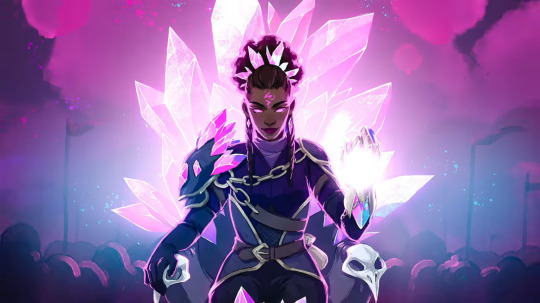
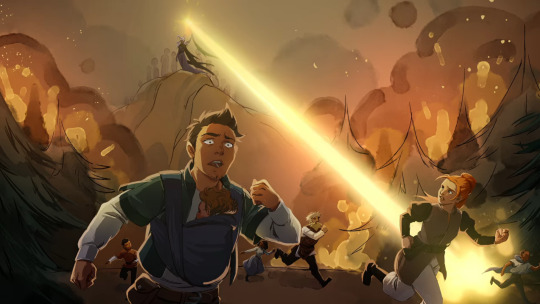
"A cruel queen once ruled Duren with an iron fist. Anyone who crossed her was banished to the icy north, where she expected them to die. But the people she banished found each other, helped each other, and survived together. Soon there were so many banished—so many people the queen had declared her enemy and doomed to die alone—that they realized they were a small army. Arm-in-arm they marched back to Berylgarten to overthrow the cruel queen and return peace to all the land." - Tales of Xadia | Gazetteer of Xadia. pg. 35
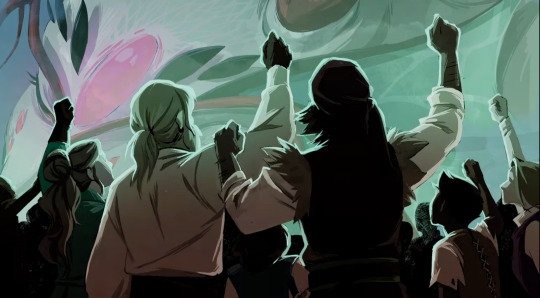
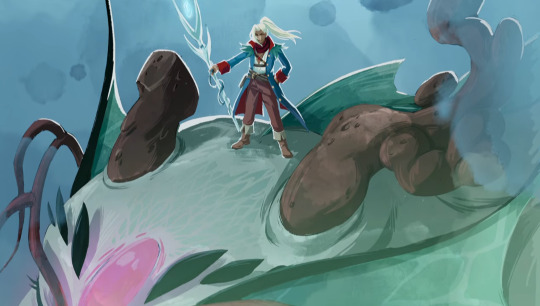
"Though he was the largest and strongest creature in Evenere, the eon-mawed megagator wasn’t satisfied. One day, he encountered a traveling mage and stole a magical artifact, hoping it would grant him great power. The megagator swallowed it… and to his delight, he began to grow. But as he grew, his stomach ached. The artifact had bled strange magic and poison into his body. Cursing his mistake, the giant megagator perished. His body became a hill in the middle of Evenere and his toxic blood entered the waters. To this day, few things survive where the megagator fell—not much can thrive once greed takes over." - Tales of Xadia | Gazetteer of Xadia. pg. 36
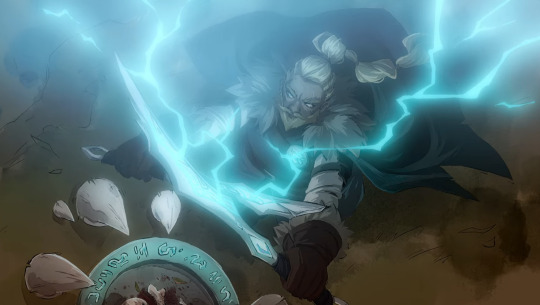
"Centuries ago, the largest mountain in Del Bar was devoid of people, and its slate-cliffed confines contained the lair of a vile dragon. Del Barians say their first king slew the foul beast and hurled it down the mountain. The dragon fell to the earth with such force that it left a rift in the land itself. The rift flooded and became the Serpentongue River./ Their tales differ from those of Hinterpeak: they tell a tale of a clever hunter who stroked the ego of an ancient dragon and pulled out its tongue to make the Serpentongue river." - Tales of Xadia | Gazetteer of Xadia. pg.32,33
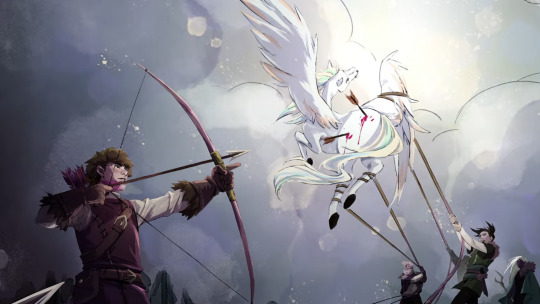
"Generous and loving beings linked to the Star primal, they’ve been hunted to extinction by dark mages eager to poach them for their horns." - Tales of Xadia | Gazetteer of Xadia. pg. 59
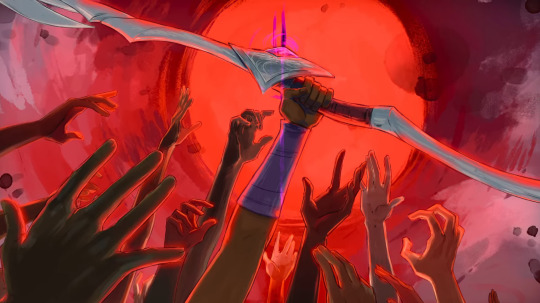
"Of course not all humans could stomach the cost of dark magic, but all humans were punished for it nonetheless. As they built new civilizations from nothing, humanity began to tear itself apart. Humans struggled for control of the region’s resources, from food to wealth to safety from Xadia’s wrath. Through the chaos, the practice of dark magic became instrumental: kings and queens offered riches and prestige to dark mages in exchange for their power—and, more importantly, their loyalty. Eventually, though, the dust settled, and five powerful kingdoms emerged from the ashes of the conflict: Katolis, Del Bar, Duren, Evenere, and Neolandia." - Tales of Xadia | Welcome to Xadia. pg.11
#jelly tarts#tdp spoilers#the dragon prince#tdp s7 spoilers#tales of xadia#some of these connections may be a stretch but im going with it#if Leola through legend can go down as an actual unicorn then a dragon can become a eon-mawed megagator through it as well
63 notes
·
View notes
Text

Thursday, December 5, 2024
Today, I came across this great article in the Elmira Star-Gazette published on November 27, 1940. It reads as follows:
Our Youth Too Soft? If the American people are inclined to get a swelled-head complex, some one is sure to come along every so often to remind them of their soft and flabby side. This useful service was performed recently by two educators, Dr. E.A. Cross, president of the University of Colorado, and Prof. P.A. Sorokin, head of the sociology department of Harvard. Said Dr. Cross: "American youths today lack qualities of exactness, precision, promptness and all the speed-up qualities in the present emergency, and are satisfied with mediocrity." They are glib, half educated, "impatient of hard work, lacking in respect for law or any kind of authority." It is up to the schools, he said, to "turn the next generation of Americans away from the soft, the cynical, the careless and the half baked toward disciplined and virile citizens." Severe words these, yet who shall say they are not deserving of earnest consideration? Whether or not this generation is worse than those of the past, it unquestionably has special temptations toward soft and aimless living that need special attention. Nor is discipline incompatible with initiative if it is rightly taught and applied. [emphasis added by me]
I guess some things never change.
57 notes
·
View notes
Text
White boy quest progress check:
Largely following through Astarion's plot has been fun consideration for Farryn's relationship with him. Farryn wants a very similar thing to what Astarion wants- Security. But he's aware, much like his magic, that the world is chaotic. There are no guarantees, farryn refuses to believe Fate is prewritten and unchangeable, and so the pursuit of total power, to him, only provides another element of chaos as opposed to stability.
Because Farryn suffers from being my first pc I'm trying to do the "right" things with him but it's become apparent over the course of the game that he'd rather let others choose what they think is right for them as thats Something he had to fight for himself.
But he also reserves the right to tell others he thinks they're wrong <3
This has meant that leading up to this point Farryn has been neutral/leaning slightly negative on the whole ascension thing- not because of the sacrificing others aspect, but because surely it can't be that good. Farryn is weary of it actually working at all but if thats what keeping astarion happy rn, he'll play alongr
and walking around the palace, checking in on Astarion?? Oh. Farryn has realised his boyfriend is dumber than he had previously checked him for. And that doesn't mean he wants to strip astarion of choice of his own future, but it does mean he will not hold back about his judgement fjdkdkd
time to play more baldur gate!! i found out smmn funky happened with my Daeris file and i might have to redo some stuff but ah well,, more screenshot opportunities ig
but aaaa anguish and suffering. back to the act 3 farryn grind 👍 (i love him act 3 is just stressin me oooouut)
#Still skulking around the main house area because i got detoured by the baldurs gate gazette#you know how it is finding a silly sidequest.#but yeah thinking abt Farryn's relationship with Astarion is like realising this exact version of Farryn is. as nice as he gets to the worl#like. he's such a fun character that's emerged beyond “i want to play a nice character”#because. I've failed a lot at being nice.#not all the time!!! but a lot#farryn (tav)#farryn wants to believe he can do the right thing this time!!! but he cares abt Astarion's choices too#ultimately farryn doesn't want to lose astarion. hes downbad. and power corruption is something he is averse to witnessing among anyone#rambles#next update I'll put under a read more because of course i know what to expect as i progreas but I'm also like. oh man#chewing#ready to see how this pans out#i also realised i need to make food#i play this game at a gd snails pace lol
6 notes
·
View notes
Text
The newspaper — the South Sea Gazette, apparently — is so old it practically crumbles under Ace’s fingers, the paper yellow and powdery with age, the edges disintegrating into nothing from however many years of being picked up and handled. The headline reads: Maniac Schoolteacher Slaughters Classroom. The photo on the front page shows a small schoolhouse, showing signs of wear and hodge-podge repair, like the town it belonged to couldn’t afford it’s upkeep but did their best anyway. The stairs leading up to the front door are bloody, and there’s more blood streaked across the windows from the inside. One small hand can be seen poking out the edge of the doorway, flopped limp across the floor. A group of Marines drag the “Maniac Schoolteacher” away from the scene of the crime in chains while he flails and struggles.
It… It’s Jiru. A very young Jiru, he can’t be any older than, god, maybe his early twenties? If that? He looks like he’s barely Ace’s age in this photo, and his face—
It’s not the face of a maniac who just went on a bloody rampage and murdered a bunch of kids. His hands and clothes are streaked with blood, but not nearly enough to account for the carnage implied behind him, and his face is wet with tears. The look in his eyes is one of such gut-wrenching despair that Ace has to tear his eyes away. The rest of the article is just — bullshit, Ace is sure, and the letters are dancing around and he doesn’t want to read it anyway so he doesn’t bother trying to make them quit goofing off and get back where they go. He just… stares blankly instead at where his hands are digging into the paper, crumbling it more under his grip.
“Ah,” Jiru says. “I should’ve put that away.”
Ace startles, whirls around. The fourteenth division Commander is leaning in the doorway, arms crossed and shoulders slumped, eyeing Ace with an unreadable expression.
“I’m sorry,” Ace says, scrambling to put the paper back where he found it. “I’m — sorry, I didn’t mean to snoop. I was coming to see you about watch rotations. Pops said you’re in charge of that?”
“That I am.” Jiru enters his room. Ace has to scramble out of his way when he walks to the desk, lifting the newspaper up delicately — not like he’s handling something precious, but like he’s handling something that disgusts him. Or, maybe, something that bites. Something that hurts to touch. “The transfers from the Moby 3 haven’t been added to the Watch Rotation yet, and won’t be until we know how long repairs will take. That’s not why you were taken off the night watch. You were taken off of the night watch for your narcolepsy, and Tate scares me, so you’re not going back on the night watch unless there’s an emergency.”
“But—”
“No buts. She will stab me with needles.”
That’s… probably true. Ace still scowls at the unfairness of it all. He focuses on that — on the absolute crime that is all these damn people caring about his health and his wellbeing and his safety — so that he doesn’t have to focus on the paper while Jiru carefully slides it into an empty drawer and then locks that drawer shut. The key gets hung up on a hook by his desk, where it’s immediately covered by the fabric of the cloak that’s also hanging there.
“… You can ask,” Jiru says, after a moment. “It’s not a secret.”
Ace startles again, tears his eyes away from the closed drawer. Jiru’s face is still unreadable, but he doesn’t look angry, really. Ace bites his lip.
“What… happened?”
Jiru snorts. “Not did you do it?”
Ace snarls, “You didn’t do it.”
Now Jiru smiles. It’s a really shitty, awful, sad little smile, and Ace kind of hates it. “No,” he confirms. “I didn’t do it.”
He walks to his bed. Takes a seat. Scrubs a hand over his face. “… You ever hear that rumor about Gold Roger having a kid?”
Ace goes very, very still.
Jiru must see his reaction, but he must misunderstand it, because his smile grows — not sad anymore, but bitter and hurting and furious. “Yeah. Wasn’t ever anything but a rumor, mind you. Stories and gossip. The Marines didn’t have any leads, didn’t have any proof. Didn’t have anything but ‘somewhere in the South Blue�� and ‘somewhere between the ages of eight years old and literally an unborn fetus’.”
Here he chokes a laugh, flicks his fez off to scrub a hand over his shaved head. Takes a slow, shaking breath, and then another one. “… It wasn’t my kids,” he says. “Every one of them had fathers known and accounted for. It wasn’t any of my kids. But, hey, what’s logic in the face of justice?”
From somewhere far away, Ace is aware of the sensation of his own tongue, clicking dry against the back of his throat. His own voice, echoing down a distant tunnel. “If — if one of them was Roger’s son?” He hears himself ask. “What would you have done?”
Jiru looks at him for a moment, considering. Scratches over his head again. “Aw, hell, Ace, I dunno,” he says finally. “I’d like to say I would have scooped the kid up and ran for it, but… back then…” That fucking smile, all bitterness and regret. Ace really does hate that smile.
“Back then,” Jiru says, “I just wasn’t fast enough.”
#One Piece#Portgas D. Ace#Portgas D Ace#Fire Fist Ace#Speed Jiru#Whitebeard Pirates#rubs my angst-loving hands all over your undeveloped side characters#hippity hoppity your backstory is now my property
58 notes
·
View notes
Text
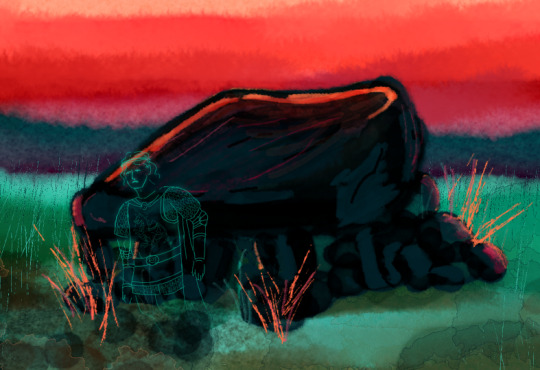
ii - Ruin - Maen Arthur
The 25 ton capstone of an ancient burial chamber near Reynoldston, north of Cefn Brynis, West Glamorgan (SS490905) is called Arthur’s stone and his ghost is occasionally said to emerge from underneath it – it is explained as a stone that was tossed from Arthur’s shoe
Text from: A Gazetteer of Arthurian Onomastic and Topographic Folklore by Dr. Caitlin R. Green (see page 9 of the linked PDF)
This was entirely experimental, and went in a totally different direction, in part because @mortiscausa had mentioned Wales/the Welsh influence somewhere as an additional layer to the challenge which I gladly accept, and partly because look at the ink bleeding effect on those brushes.
It did not help that I revisited the palette, and saw some of the amazing pieces that had already been posted. And that locked in landscape.
#arthuriana#mythology#art#march to camelot#mtc 2025#peculiarly mine#(Originally was thinking of maybe going with the Lady of Shallot)#(then also played with the idea of possible Dark is Rising sequence fanart)#(which well...)#(anyway that is supposed to be a dragon on the surcoat)#(the Pendragon crest)#(time to go into the tag and queue up some art)
26 notes
·
View notes
Text

The National Treasure Gazette Humbly Presents:

National Treasure: The Musical
I said what I said.
For reasons that have nothing to do with Wicked (2003) or Wicked (2024) (obviously I am lying) here we go:
INT. GATES FAMILY HOME LIVING ROOM - NIGHT
SONG: Treasure is a Myth
At the Gates’ family home YOUNG BEN sneaks away with the family album and his grandfather JOHN ADAMS GATES finds him and explains the legend of the treasure.
The ensemble—as all of the GATES MEN since and their WIVES—each give a quick verse about their search and continued hope that someday they will find the treasure.
The recurring motif here is 'Treasure is a myth…but I’ll find it.'
Until PATRICK GATES arrives to spoil things with a counter refrain, arguing that the treasure is a myth so move on and make something of your life.
The song ends with Patrick towing Young Ben off stage as he sings wistfully, “Treasure is a myth…but I’ll find it.”
EXT. ARCTIC CIRCLE - DAY
At the same time, adult BENJAMIN FRANKLIN GATES enters from the other side of the stage in snow gear.
He echoes “Treasure is a myth, but I’ll find it.”
END SONG
Then RILEY, IAN, and IAN’S CREW follow behind him in snow gear with metal detectors.
Join me in hallucinating the rest of Act I of National Treasure: The Musical!
↓ ↓ ↓
Riley and Powell have the “how does a ship wind up way out here?” exchange.
A metal detector BEEPS. Ben and Ian fall to their knees uncovering evidence of the Charlotte (pantomimed).
They file off stage and reappear…
INT. CHARLOTTE - DAY
…inside the frozen remains of the Charlotte. Some comedic exchanges from Riley before Ben finds the MEERSCHAUM PIPE. He reads the riddle and sits to figure it out.
SONG: Charlotte’s Riddle/So Close I Can Taste It
This is Ben’s I Want song. As he tries to work out the meaning of the riddle he reflects on how he finally has the next piece of the puzzle in his hands and we get to hear a little bit more about what that means to him.
This is an important character moment for Ben and the first time we really hear from him directly about why he wants to find the treasure.
It also personifies Charlotte briefly as a haunting female voice beckoning him to come find the treasure.
END SONG
Ben figures out the riddle and Ian suggests they borrow the Declaration.
SONG: Invested
Ian explains a bit about his backstory, how he’s done things like this before. His crew chimes, each listing a crime of heist they’ve been involved in. (Think the ‘meet the cooks’ montage from Ratatouille).
He emphasizes how much he's invested in this expedition--and in Ben-- and that he expects returns. He becomes increasingly agitated as Ben rejects his plans.
Ian laments what he’ll have to do to Ben. The song ends with him singing/saying “Now all you’ll be in a hindrance.”
END SONG
Ian orders Shaw to turn on Ben. Ben and Riley narrowly escape before the Charlotte explodes.
EXT. ARCTIC CIRCLE - DAY
Ben pulls Riley out of the literal trap door in the stage as they emerge from the ship.
Riley asks what they’ll do about Ian. Ben says they’ll stop him.
Riley says nobody will believe them, and anybody who’s crazy enough to believe them won’t help.
INT. NATIONAL ARCHIVES CURATORS OFFICE - DAY
We transition to the curator’s office where Abigail waits to greet Ben and Riley.
SONG: One Step Short of Crazy
The music begins as Abigail stands from her desk to shake the guys’ hands. They stay speaking as they exchange names and do the “Saxony German” bit.
After Abigail says, “Now, you told my assistant that this was an urgent matter?” the song begins in earnest.
This is a duet between Ben and Abigail as the both try to get what they want from the other: Ben wants access to the document and Abigail wants information.
The text of the song is “one step short of crazy” from both of them, because that’s what Ben is looking for, and what Abigail thinks Ben is.
The blocking here is that they step forward when they’re winning and back when they’re losing, so that they’re pushing each other around the stage and Riley is following along popping in and out around Ben whenever he has “helpful” information to add.
This number should be a bit flirty but make it clear that Abigail cannot be charmed. (yet).
It ends when Abigail sits back down at her desk and bids them good day. She has won.
END SONG
INT. NATIONAL ARCHIVES ROTUNDA - DAY
Ben and Riley look at the Declaration. Ben recites his favorite line. (“But when a long train of abuses…”)
SONG: One Step Short of Crazy (Reprise)
Ben reprises a few lines from One Step Short of Crazy as he is making a decision that is very much that.
END SONG
Then he speaks the line, “I’m gonna steal it. I’m gonna steal the Declaration of Independence."
INT. LIBRARY OF CONGRESS READING ROOM - DAY
Riley brings Ben into the Library of Congress to convince him that this is a bad idea. “Let me prove it to you.”
SONG: 2000 Ways This Could Go Wrong
Riley attempts to convince Ben that he cannot steal the Declaration of Independence. The ensembles appears as other LIBRARY PATRONS who get in on the song for musical reasons.
The text of the song is "There are 2000s ways this could go wrong" and they could be comedically listing all the ways Ben could get caught.
Riley and the ensemble seem to almost have Ben convinced when he brings up Thomas Edison.
The light bulbs line is spoken, but then Ben gets his own verse laying out the preservation room plan. The one way to make it work.
The song ends with Riley saying, “This could work.”
END SONG
INT. ABIGAIL’S OFFICE - NIGHT
Abigail is packing up for the night.
SONG: Hunting Down History
Abigail sings an I Want song of her own expressing her curiosity about Ben’s story and her wish that for once she’d like to be a part of something that mattered instead of on the sidelines studying it a hundred years later.
Her ASSISTANT enters with a package. (The One Step Short of Crazy theme play as she opens it.) Abigail reads the notes tells the audience it’s the George Washington button. She and the assistant discuss Ben for a few lines until Abigail realizes she’ll barely make it home to get ready and back in time for the gala.
That’s when the ALARM RINGS.
INT. PRESERVATION ROOM - NIGHT
Abigail and STAN (already in his tux) oversee at TECHS IN CLEAN ROOM GEAR move the document into the preservation room.
Stan gets a verse of Hunting Down History, hitting on Abigail and and asking if there’s anything between them.
Abigail declines and leaves.
Stan continues to lament her lack of attention as the set changes to…
INT. NATIONAL ARCHIVES ROTUNDA - NIGHT
…the rotunda, now dressed up for the gala. Ensemble is other PATRONS milling around the gala.
Abigail enters, having done a quick change into her gala outfit. She makes small talk as RILEY’S VOICE is heard from off stage.
He’s asking, “Ben, are you sure you want to do this—”
—when Ben enters the gala in his tux.
Riley comes to sit on the side of the stage with his headset and laptop. He’ll speak to Ben from here throughout the heist.
Ben finds Abigail, and hands her a glass of champagne.
Abigail sings one last verse about how maybe something interesting has found her after all.
END SONG
Abigail asks about the pipe that bigfoot took.
Stan joins them, a bit perturbed, and he and Ben go back and forth until Ben gives THE TOAST. (it's perfect--no notes)
Riley is talking throughout the scene.
Ben excuses himself. He holds up the glass to the audience and tells Riley he’s got the fingerprint.
INT. VAULT CORRIDOR/PRESERVATION ROOM - NIGHT
Ben appears at the top of some stage scaffolding where he uses the fingerprint and does the password thing. He and Riley exchange dialogue explaining how they’re using the button he sent to Abigail to do this, since we won’t see it well. Riley helps crack the password. Ben rides an elevator down to stage level.
SONG: [MAIN HEIST THEME TBD]
Meanwhile, Ian and his gang make their way up from the bottom of the stage knocking out guards and breaking through a series of movable doors that have been lined up in their way.
→ Riley comes in with a reprise of 2000 Ways This Could Go Wrong
Ben reaches the Declaration first. He’s in the process of removing it when Riley stands up because he’s lost the feed.
Ben leaves with the case as Ian arrives. Squibs go off, cracking the case.
Ben runs back to the elevator as the lights go dark.
INT. ROTUNDA - NIGHT
Riley: Ben? Ben, what was that?
Ben sneaks through the partygoers and is caught by the CASHIER, who charges him $35 for the “replica” Declaration. He fumbles to come up with the change and pays with a card.
→ Abigail spots Ben and comes in with a reprise of One Step Short of Crazy and/or Hunting Down History
Abigail chases after Ben…
EXT. NATIONAL ARCHIVES - NIGHT
… who rushes outside to meet Riley.
Meanwhile Ian and co climb up through the trapdoor with their gear.
Abigail accuses Ben of stealing it, he gives her the Declaration, and Ian’s crew grab her.
END SONG
INT/EXT. CATERING TRUCK
You know that? Fuck it, let’s do the catering truck scene.
I was gonna say this would be a more stage-friendly tug o’ war over Abigail and she ends up with Ben while the Declaration winds up with Ian. That’s the backup.
But as long as we’re hallucinating a Disney-backed musical, maybe we put the van and the catering truck on stage, yeah? We, the audience, are looking toward their open backs as the two vehicles bounce around. They’re on springs or something, sorry actors.
There’s lots of LIGHT AND SOUND EFFECTS to heighten the “chase,” which ends when Abigail jumps from one car to the other.
Ben and Abigail exchange a few lines of banter in the van before Ben asks Riley to pull over.
EXT. PARK - NIGHT
This scene will remain largely the same, but we’ll move more of the dialogue to the park so we can get out of the van set as quickly as possible. Without the chase it’ll feel weird.
The dialogue will be rearranged so it ends with Ben’s line: “Yeah but I didn’t think I was gonna personally have to tell my dad about it."
As he says this the set shifts and Patrick’s door appears behind him, so all he has to do is turn around to be confronted by it.
EXT. PATRICK’S DOOR - NIGHT
“Where’s the party?”
This remains largely the same. Patrick lets them in.
INT. GATES FAMILY HOUSE - NIGHT
Yes, as a fun easter egg we can use the same Gates family home set as the opening number, to both maximize set use and make my headcanon about the Gates family house canon. Cool.
SONG: The Real Gates Family Legacy
Patrick hopes this isn’t about the damn treasure. Obviously it is.
Ben and Patrick go back and forth about their mutual disappointment in each other. Patrick wants Ben to stop wasting his life on the same mistakes that he, Patrick, made, and Ben just wants his dad to believe in him.
Riley and Abigail get a quick verse about their observations of the pair, Riley from the POV of someone who knows a bit of their backstory (and might even share a line or two) and Abigail as someone who’s just meeting them.
Ends with Patrick giving up and saying, “Do what you want Ben.”
END SONG
Abigail raises the very real possibility that there isn’t another clue. Ben says they can find out right now.
SONG: Talk to Me
In this number (better title TK) Ben gets the lemons and basically asks the map makers/founding fathers to talk to him. Tell him the message he’s been waiting his whole life to hear.
Then Abigail stops him and insists on being the one to actually do the lemon-ing. Her verse is a bit more delicate, but she too is genuinely asking for the document to say something to her.
Their parts come together and then—nothing.
This is being visualized by a scrim at the back of the stage. It’s been there for other scenes, and is a sort of parchment texture, but it’s only as the song progresses that we the audience realize it’s changing.
Light effects will be used to turn the whole stage into a VISUALIZATION OF THE DECLARATION, matching what Ben and Abigail are doing at the table on stage. First come the faint stains of the lemon juice.
Then Patrick interrupts to tell them they need heat.
Ben and Abigail breath on the Declaration and the masonic compass flickers into view momentarily on the scrim.
“We need more juice.”
“We need more heat.”
They sing the next verse of the song together as more and more of the map becomes visible. They’re asking the map to talk to them, but subtextually also asking the same of each other.
Thematically the song is saying please tell me there’s something to this. tell me i’m not crazy; tell me I’m not alone.
→ the ensemble reappears as the Gates family ancestors
→ the Charlotte’s Riddle theme and voice reappears as well
→ Patrick joins in with a reprise of The Real Gates Family Legacy
→ Riley joins in with a few lines about how he can’t believe this is really happening
→ young ben reappears to reprise Treasure is a Myth
All of the voices combine into that delicious thing where everybody’s singing their Act I theme over each other (I really can't emphasize enough how much delight this trope brings me) as the extent of the cypher is revealed.
Riley: What is it?
Ben: (barely believing what he’s seeing) A treasure map.
END SONG
END ACT I
#the national treasure gazette#national treasure#national treasure the musical#i'm so sorry#but actually i have no regrets at all#ben gates#abigail chase#riley poole#ian howe#patrick gates#fanfiction#technically i guess#i made a thing
25 notes
·
View notes
Text
GiGS vol. 420 (October 2015)
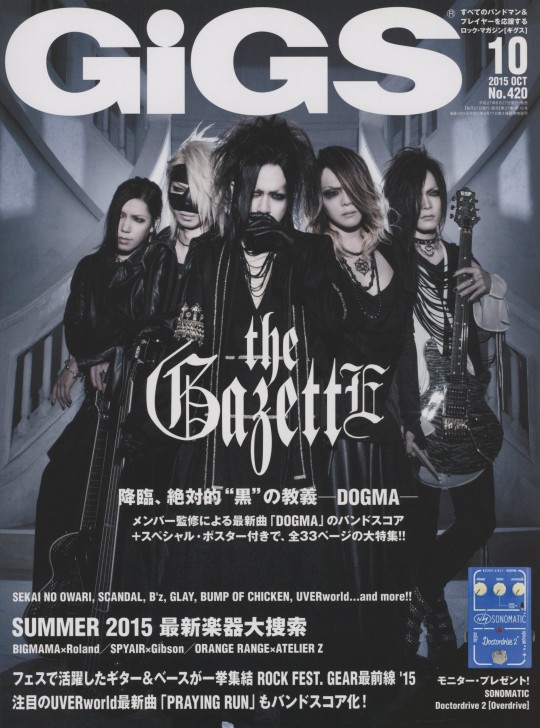
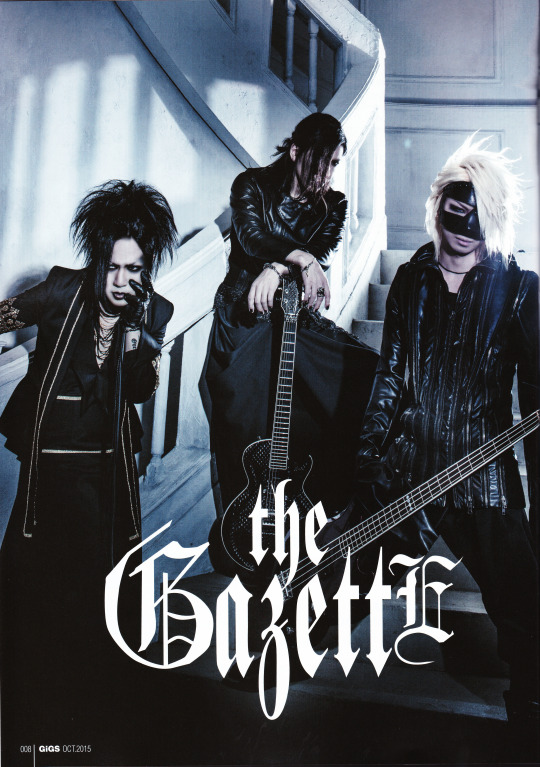
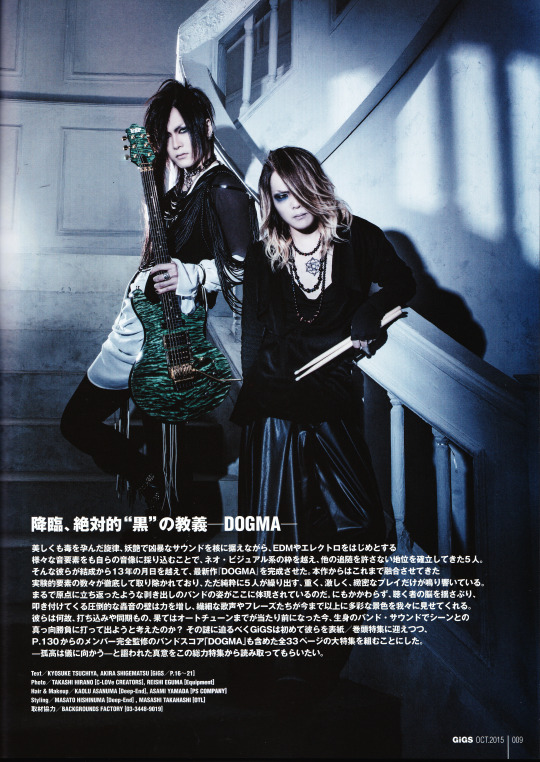
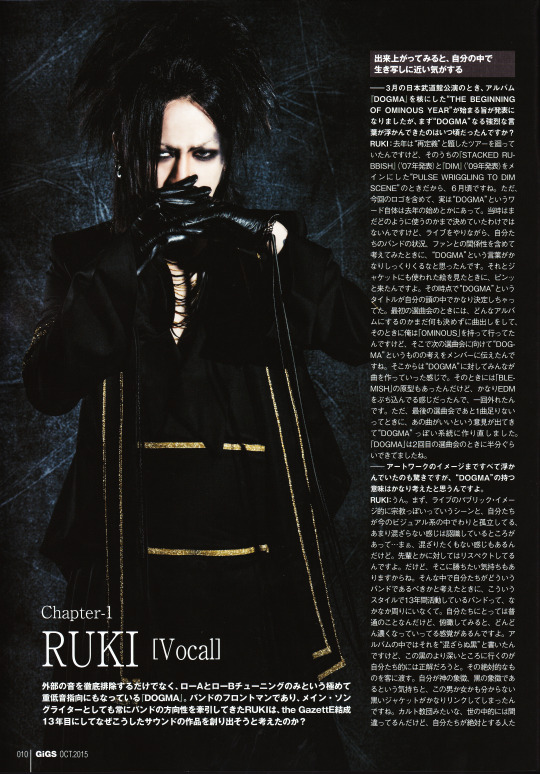
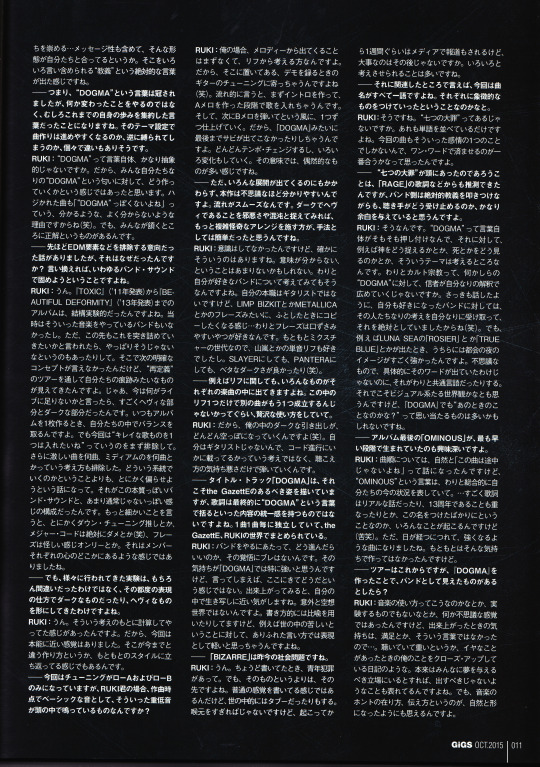
Chapter 1 - RUKI [Vocal]
“DOGMA”, with its intense focus on low frequencies, eliminates external sounds entirely, utilizing only low-A and low-B tunings. As the band’s frontman and primary songwriter, RUKI has always steered the direction of the GazettE. Why, after 13 years since the band’s formation, did they choose to create an album with this kind of sound?
“When the album was finished, I felt it was almost like an exact reflection of myself.”
Interviewer: At the March performance at Nippon Budokan, it was announced that THE BEGINNING OF OMINOUS YEAR, centered around the album DOGMA, would begin. When did the powerful word "DOGMA" first come to mind?
RUKI: Last year, we had a tour titled Redefinition. Among those shows, we had PULSE WRIGGLING TO DIM SCENE, which focused on STACKED RUBBISH (released in 2007) and DIM (released in 2009), so it was around June. However, the word DOGMA itself, including the album cover design, had already existed as early as the beginning of last year. Back then, I hadn’t decided exactly how to use it yet. But as we continued performing live, I began reflecting on the state of our band, our relationship with our fans and the term DOGMA felt very fitting.
When I saw the artwork used for the album cover, it all came together. By that point, the title DOGMA had already been cemented in my mind. For our first song selection meeting, we hadn’t decided on what kind of album it would be yet; we just brought in songs. At that time, I brought in “OMINOUS.” It was during this process that I shared my idea of “DOGMA” with the other members as a direction to aim for in the next selection meeting. From there, everyone started creating songs with “DOGMA” in mind.
There was an early version of BLEMISH, but it had a strong EDM influence, so we set it aside. However, at the final song selection meeting, when we realized we needed one more track, someone suggested bringing that song back and reworking it into a more DOGMA-esque style. By the second song selection meeting, about half of the album was completed.
Interviewer: It’s surprising that you had the artwork’s image in mind so early on. I assume you also thought deeply about the meaning behind “DOGMA.”
RUKI: Yes. First, from the perspective of our public image during live performances, there’s this religious-like aura. At the same time, we’re aware of our somewhat isolated position within the current visual kei scene—we don’t really mix with others. Though, honestly, we don’t want to mix either. Of course, we respect our predecessors in the genre, but we also have a desire to surpass them.
When we considered what kind of band we should be, we realized that there aren’t many bands like us that have maintained this style for 13 years. It’s something natural for us, but if I take a step back and look at it from a bird's-eye view, it feels like our essence keeps becoming denser. In the album, we described this as "unmixable black." For us, delving deeper into that blackness felt like the right path. Our goal was to hand over something absolute to our audience.
The idea of myself as a symbol of divinity, symbol of blackness, resonated deeply with the androgynous figure on the black album jacket. It evokes the image of a cult—one that society might see as misguided, but which worships its own absolutes. That message, that structure, felt perfectly aligned with who we are. From there, the absolute term ‘dogma’ naturally emerged.
Interviewer: In other words, while the word “DOGMA” became the title, it wasn’t about doing something completely different. Instead, it served as a term that encapsulated your journey so far. With that as the theme, did it make the songwriting process easier, or did it feel restrictive? It seems like this could differ for each of you.
RUKI: The word DOGMA itself is pretty abstract, right? So everyone approached it by interpreting what DOGMA meant to them. Songs were rejected for reasons like, “This doesn’t feel like DOGMA,” which is both understandable and a bit vague (laughs). But when everyone agreed on something, that became the “right” answer.
Interviewer: You mentioned earlier that EDM elements were intentionally removed. Why was that? In other words, was it an effort to focus on a more traditional band sound?
RUKI: Yes. From TOXIC (released in 2011) to BEAUTIFUL DEFORMITY (released in 2013), our albums were quite experimental. At the time, there weren’t many bands doing that kind of music. But we questioned whether we wanted to continue pursuing that direction, and the answer was no. While we didn’t have a clear concept for what to do next, through the “Redefinition” tour, we started to see traces of ourselves—what made us who we are.
Then we asked ourselves, “What is the current live experience missing?” And the answer was something much heavier and darker. Whenever we make an album, we usually balance different aspects within ourselves. But this time, we first decided to eliminate the idea of including “at least one clean, melodic song.” We also threw out the approach of trying to balance things like “how many heavy songs, how many medium-paced ones” and so on. Instead of worrying about maintaining a variety, we decided to focus on leaning into extremes.
That’s why the album structure ended up with a sound that felt like a band’s raw essence but also unconventional at the same time. To get into more specifics, we really pushed down-tuning, completely banned major chords (laughs), and insisted on phrases that felt eerie and unsettling. I think these ideas were something that existed within each of the members’ hearts somewhere.
Interviewer: Still, the various experiments you’ve conducted weren’t mistakes. They were ways of shaping darkness and heaviness through different methods of expression at the time, weren’t they?
RUKI: Yeah, there was definitely a calculated aspect to it. But this time, it felt much closer to instinct. That’s what makes the process different from before, and in a way, it also feels like we’ve returned to our original style.
Interviewer: For this album, you’ve used Low A and Low B tunings exclusively. When composing, do those heavy bass tones naturally sound in your head as the foundation?
RUKI: For me, it doesn’t start with a melody but with a riff. So, the tuning of the guitar I use for recording demos often influences the process (laughs). Usually, I’ll begin with the intro, then add the verse, and by that point, I’ve already layered vocals. Then I create the bridge and so on, building one section at a time. That’s why, with a song like DOGMA, the chorus might not even appear until the very end. The tempo keeps changing, and the structure evolves. In that sense, it’s a very spontaneous process.
Interviewer: Despite all these evolving developments, the album is surprisingly cohesive. The flow is seamless. If one considers “darkness” and “heaviness” as themes that suggest evil and chaos, it might have been simpler, in terms of technique, to go for a more convoluted, chaotic arrangement.
RUKI: I wasn’t consciously aware of that, but I think you’re right. There’s not much that feels incomprehensible. Even with bands I admire, I notice that. I’m not a guitarist by trade, but I love riffs that make you want to copy them on a whim, like those from Limp Bizkit or Metallica. I’m from the nu-metal generation, so I also like single-note riffs from bands like YamaArashi. Even with Slayer or Pantera, there’s something great about straightforward classic darkness (laughs).
Interviewer: Speaking of riffs, each track features so many distinct ones that any single riff could serve as the basis for an entirely new song, yet you use them so lavishly.
RUKI: That’s why the dark drawer in my mind keeps getting emptied out bit by bit (laughs). Since I’m not a guitarist, I don’t think in terms of how the riffs fit into chord progressions. Instead, I just play based on how unsettling they sound to me.
Interviewer: The title track, DOGMA, truly captures what the GazettE stands for. However, the lyrics aren’t bound by the term “DOGMA” as a unifying theme. Each song feels distinct, yet they’re all brought together by the world of the GazettE and RUKI.
RUKI: When it comes to this band, there’s no hesitation about the direction we need to take. That resolve is particularly strong in “DOGMA.” But to put it bluntly, it’s not about how things have suddenly come together here. When the album was finished, I felt it was almost like an exact reflection of myself. It’s surprisingly not a fantastical world. Though I use metaphors in my writing, when addressing topics like the struggles of society, I feel that expressing them in clichéd ways would come across as too superficial.
Interviewer: For example, you’ve mentioned that BIZARRE reflects recent social issues.
RUKI: Yeah. While I was writing it, there was a youth crime incident happening. But it’s not so much about the event itself as what comes afterward. I write about it from what feels like an ordinary perspective, but to society, it might be a taboo. It’s like that saying “once it’s out of sight, out of mind”—for about a week after an event, the media covers it, but the important part is what happens afterward, isn’t it? These kinds of things make me think a lot.
Interviewer: On a related note, this time all the track titles are single words. It seems like each word was chosen to be highly symbolic.
RUKI: That’s right. You know the concept of the “seven deadly sins”? They’re just listed as single words, aren’t they? The songs on this album similarly represent just one emotion each, so I felt that single-word titles suited them best.
Interviewer: The influence of the “seven deadly sins” concept is apparent, especially in lyrics like those in “RAGE.” However, while the band delivers its absolute doctrine, it feels like you leave a lot of space for listeners to interpret things in their own way.
RUKI: That’s right. The word “DOGMA” itself is inherently imposing. So it’s about how you interpret things like God, or how you perceive death—those are the themes being explored. Cult religions, for example, often take some form of “DOGMA” and have their followers spread it through their own interpretations, don’t they? Like I mentioned earlier, when I fell in love with certain bands, I absorbed their messages in my own way and took them as absolute (laughs).
But, for example, when songs like LUNA SEA’s “ROSIER” or “TRUE BLUE” were released, for us, they conjured a strong image of the city at night. It’s strange because those words weren’t explicitly referencing that, yet they became a shared language of sorts. I think that’s the essence of the visual kei world—the ability to evoke such collective imagery. Similarly, with DOGMA, listeners might connect it to certain moments in their lives.
Interviewer: It’s fascinating that OMINOUS, the final track on the album, was one of the first songs created.
RUKI: When deciding on the track order, it naturally felt like “this song doesn’t belong in the middle.” The word OMINOUS represents our current state as a band. The song has real, raw lyrics and coincides with our 13th anniversary. It feels like naming it that brought about various events (laughs). Over time, the track has grown stronger. Initially, we didn’t create it with those emotions, but it ended up carrying them.
Interviewer: As you head into the tour, what do you think creating “DOGMA” has revealed about the band?
RUKI: It’s made me think about how music is meant to be used—not as an experiment but as a medium for genuine expression. When it was finished, my feelings weren’t ones of satisfaction or anything like that. Listening to it feels heavy—it’s like a diary zooming in on my thoughts during tough times.
Normally, we’re expected to inspire dreams, but some of what’s conveyed here might not align with that role. But in a way, I feel like the essence of music—how it truly should exist and how it should be conveyed—naturally took form through this process.

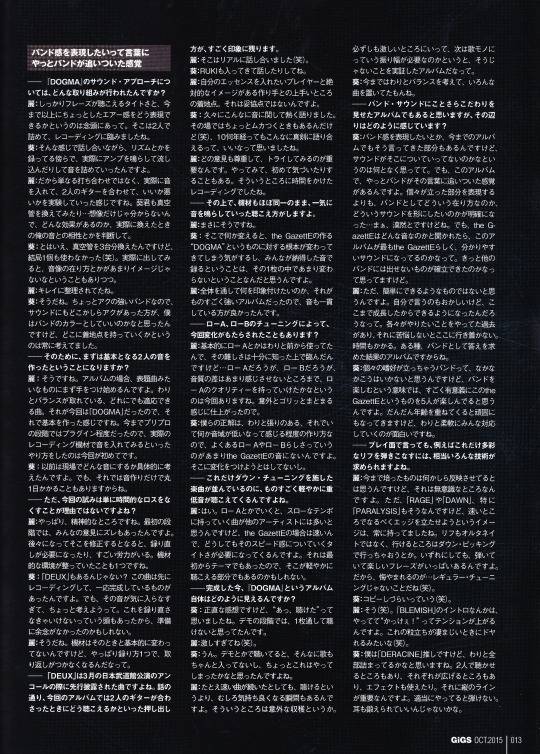
Chapter 2 - Uruha [Guitar] & Aoi [Guitar]
The raw and unfiltered band sound, crafted by the clash of all five members’ music, forms the foundation of “DOGMA.” To enrich and deepen the essence of this work, Uruha and Aoi wrote four tracks: “DERACINE,” “WASTELAND,” “GRUDGE,” and “PARALYSIS.” As guitarists, how did the two of them approach this album?
Interviewer: What kind of approach did you take toward the sound of DOGMA?
Uruha: We focused on achieving a tight sound where each phrase could be heard clearly, while also exploring how to incorporate a subtle sense of airiness, more so than ever before. That was something the two of us worked on extensively before heading into recording.
Aoi: While discussing things like that, we would be recording the rhythm parts, and at the same time, we’d crank up the amps and pour the sound into the mix, refining it bit by bit.
Uruha: So it wasn’t just a simple meeting. It felt more like we were experimenting by actually playing and layering the sounds of our two guitars, judging whether it worked or not. Aoi even swapped out vacuum tubes… You can’t really understand the impact just by imagining it. So we’d listen to the changes and judge how well it meshed with my sound.
Aoi: That being said, I replaced three tubes, but in the end, we didn’t use a single one (laughs). When I actually heard the sound, it didn’t quite match the image I had in mind for the tonal balance.
Uruha: Everything ended up sounding very clean and organized.
Aoi: Yeah. Since we’re a band with a fairly strong “bite,” I thought having a bit of grit in the sound would be better for expressing our unique color. But I was always thinking about where to find the right balance for the final result.
Interviewer: So, does that mean you first focused on creating the foundation of the two guitars' sounds?
Uruha: That’s right. When working on an album, we usually start with something like the title track—a song that has a relatively well-balanced sound and can adapt to anything. This time, that song was "DOGMA," so we built the foundation around that. Up until now, the pre-production stage mostly involved plugins, but this time, we actually used the recording equipment during pre-production to get the sound. That was a first for us.
Aoi: Previously, we’d only think about what kind of sound we wanted on the spot during the session. But that approach could mean spending an entire day just crafting a single sound.
Interviewer: But, the purpose of this new approach wasn’t simply to save time, right?
Uruha: It’s about the mental side of things. At the beginning, there were some discrepancies in everyone’s opinions. If we had to fix those differences later, it would mean re-recording and putting in an enormous amount of effort. Having the right technical setup from the start was a big factor as well.
Aoi: DEUX might have been part of it too, don’t you think? We had recorded that song earlier and thought it was finished. But I just couldn’t stand the sound of it, so we decided to rethink things. Knowing that we might have to re-record it probably pushed us to prepare even more thoroughly.
Uruha: That’s true. The equipment itself hasn’t changed much since then, but just the way you record something can lead to results you can’t take back.
Interviewer: DEUX was performed as an encore during your Nippon Budokan show in March, right? As you mentioned, the way the two guitars blend on this album is particularly striking.
Uruha: That’s something we discussed in detail (laughs).
Aoi: Ruki also joined in on those discussions.
Uruha: It’s about finding the ideal balance between a player’s desire to add their essence and a creator’s absolute vision. It’s not about compromise.
Aoi: It’s been a long time since I’ve had such passionate discussions about sound. It can be frustrating in the moment (laughs), but even after all these years, being able to have such serious conversations is something I really appreciate.
Uruha: It’s important to respect all perspectives and try things out. There are insights you can only gain after trying things. This recording process really emphasized that.
Interviewer: And despite all this effort, the sound seems unified, as if the equipment remained consistent throughout.
Uruha: That’s right.
Aoi: If we were to change something, it feels like it would fundamentally alter what the GazettE’s "DOGMA" is supposed to represent. Recording with a sound that everyone agreed upon also meant that the tonal consistency across the album wouldn’t fluctuate too much.
Uruha: Since the album had such a strong and clear theme throughout, keeping the sound consistent was the best choice.
Interviewer: Did the use of low A and low B tunings contribute to this evolution?
Uruha: We’ve used low A tuning before, so we were aware of its challenges. But this time, I think we managed to elevate the quality to the point where you can’t distinguish much between low A or low B in terms of tonal quality. It came together in a surprisingly solid way.
Aoi: Our "right" answer tends to be a sound that’s bright and taut, yet gives a subtle impression of being lower in range. The typical characteristics of low A or low B tunings don’t really fit the GazettE’s sound, so we didn’t aim to emphasize them either.
Interviewer: It’s remarkable how the songs employ such heavy downtuning yet still deliver low-end sounds with such a light, effortless quality.
Uruha: Yeah. When artists use low-A tunings, they often go for slower-tempo songs. But in the GazettE’s case, the songs are fast, so we needed a tightness that could keep up with that speed. That was something we set as a theme from the start, and I think it contributes to why the sound feels so light and agile.
Interviewer: Now that it’s finished, how do you see the DOGMA album as a whole?
Aoi: Honestly, my first reaction was, “Ah, I can listen to it.” During the demo phase, I didn’t think I’d be able to listen to it all the way through.
Uruha: It was too intense (laughs).
Aoi: Yeah. In the demo stage, the vocals weren’t fully recorded, and I wondered if we had gone too far.
Uruha: Even when fast-paced tracks follow one after another, there are moments that don’t just feel listenable—they actually feel good. That was an unexpected discovery for me. This album proved that it’s not necessarily essential to switch between heavy tracks and more melodic ones to create variety.
Aoi: In the past, we usually aimed for balance by including a variety of songs.
Interviewer: This album seems to emphasize the band’s sound more than ever. How do you feel about that?
Aoi: We’ve talked about wanting to express a “band feel” on previous albums, but I always felt like our sound hadn’t fully caught up to that idea. With this album, though, I feel like the band has finally caught up to that concept. Instead of focusing on highlighting individual parts, we really clarified what it means to exist as a band and what kind of sound we wanted to create as a whole. It’s still a bit abstract, but if someone asked, “What is the GazettE’s sound?” I think this album represents it in the clearest, most GazettE-like way. I also feel like we’ve established something unique that other bands wouldn’t be able to replicate.
Uruha: That said, this isn’t something that can be easily achieved. It's weird for me to say it, but I think we were only able to do this because we’ve grown so much as a band. Each of us had a period in the past where we were focused on doing what we wanted individually. Without struggling through that phase, we wouldn’t have arrived here. It takes time. In a sense, this album is the result of seeking answers as a band.
Aoi: Bands where the individual members’ preferences dominate can’t really pull something like this off, I think. But I think the five of us really enjoy being in the GazettE together. Even as we grow older and maybe more set in our ways, everyone is surprisingly flexible. That’s something I find really interesting.
Interviewer: Speaking of your playing, mastering such a wide variety of riffs must have required a considerable amount of technical skill, right?
Uruha: I think we naturally reflect what we’ve built up over time, even if we’re not always conscious of it. For tracks like “RAGE,” “DAWN,” and especially “PARALYSIS,” I always had this image of trying to emphasize sharpness and clarity in the faster sections. For example, instead of relying on alternate picking, I’d push to use down-picking where possible. But in any case, the riffs are genuinely fun to play. What I regret, though, is... that it’s not in standard tuning (laughs).
Aoi: Makes it harder for people to copy (laughs).
Uruha: Exactly (laughs). Take the intro of “BLEMISH”, for instance—playing it gets me hyped, like, “This is so cool!” It’s that moment when the sound is crisp and precise, and you can really show off (laughs).
Aoi: My favorite is “DERACINE.” I think it has a little bit of everything. There are moments where we play together, times where we each expand the sound in our own way, and opportunities to use effects. Plus, the vertical alignment of the parts is crucial. If you’re sloppy, you can’t pull it off. It’s a challenge for your ears, too, so I think it’s good practice.

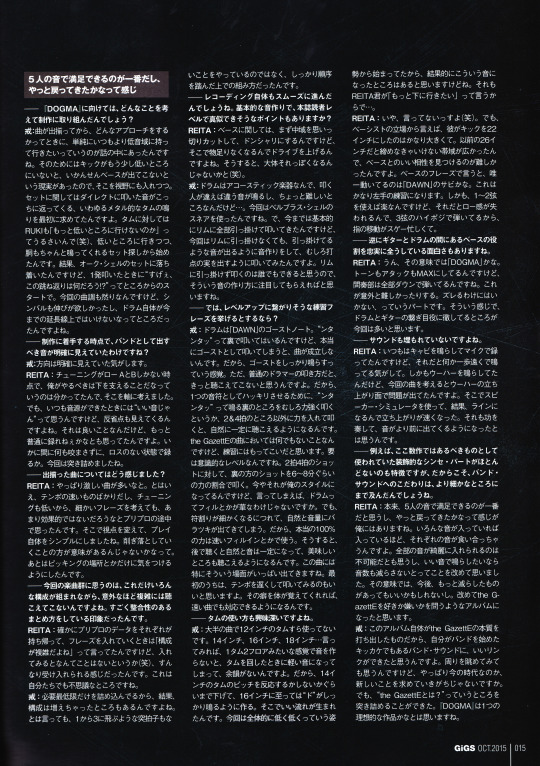
Chapter 3 - REITA [Bass] & Kai [Drums]
The album “DOGMA” features an unprecedented low-end heaviness that spans its entirety. For REITA and Kai, who are responsible for anchoring the band’s sound, this required heightened awareness and innovation in both playing and sound production. In this chapter, we explore what the two of them focused on during the album’s creation.
Interviewer: What kind of thoughts went into the production process for DOGMA?
Kai: Once we had the tracks ready, we talked about how to approach them. One key idea was to bring more focus to the low-end frequencies than usual. To achieve that, the kick drum needed to sit lower in the mix, because otherwise, the bass wouldn’t come through clearly. With that in mind, I started by considering the drum setup. Initially, I aimed for toms that would give a more direct, metallic resonance, like what you often hear in metal. RUKI was quite particular, saying, “Can’t you go lower?” (laughs). So, we began with finding a kit that could deliver a low sound while still allowing the shells to resonate properly.
We ultimately settled on an oak-shell kit. When I hit it for the first time, I thought, “Whoa, what is this incredible rebound!?” That was the starting point. The nature of the tracks this time also called for cymbals with more sustain, so it felt like I couldn’t stick to the same approach as before. The drums had to evolve beyond the familiar.
Interviewer: It seems that by the time you started production, you already had a clear vision for the sound the band wanted to create.
Kai: Yes, I feel like we had a clear direction.
Reita: When the tuning is as low as A or B, I knew my job was to provide a solid foundation for the sound. That became my focus. Whenever we finish recording, I always think, “This sounds great,” but I also notice areas to improve. That’s a good thing, of course, but at the same time, I found myself wondering if we couldn’t record more simply. How do we capture the sound with as little interference and loss as possible? That’s what we really honed in on this time.
Interviewer: How did you feel about the finished tracks?
Reita: I thought, “Wow, there are a lot of intense tracks!” But since the tempos are fast and the tuning is low, I realized midway through the pre-production process that intricate phrases wouldn’t be very effective. So, I shifted my approach to make the playing itself simpler. Stripping things down felt more meaningful. After that, I just focused on details like where I placed my picking hand.
Interviewer: Despite the variety in these songs' structures, they don’t sound overly complex. Instead, they feel like they’ve been tied together with a great sense of cohesion.
Reita: That’s true. During pre-production, when we took the demo data home to work on our parts, we’d say, “The structures are pretty complex,” but once we actually added the parts, it all came together surprisingly smoothly (laughs). It felt natural, which was a bit of a mystery even to us.
Kai: I think it’s because we packed in only the essentials. As a result, some of the arrangements became more elaborate, but it’s not like we jumped randomly from point A to point C. The songs follow a clear progression, which made the structures feel logical.
Interviewer: Did the recording process itself go smoothly? Are there any techniques for basic sound production that our readers might be able to replicate?
Reita: For the bass, the first step is to cut the mid-range completely to create a scooped sound. That can feel a bit lacking, so you boost the drive, and it starts to sound right (laughs).
Kai: Drums are acoustic instruments, so the sound changes depending on who’s playing, which makes it a bit tricky. This time, I used a bell brass snare drum. Normally, I play with all the hits catching on the rim, but this time I worked on creating a tone that sounded like it was caught on the rim even when it wasn’t. Instead, I focused on producing a sound that emphasized the core of the drum hit. Since anyone can try playing without using the rim, I’d recommend experimenting with that kind of sound design.
Interviewer: Are there any practice routines you’d recommend that might help with skill improvement?
Kai: For drums, I’d recommend the ghost notes in "DAWN." The notes played in the background go like "nta nta-t." While they’re ghost notes, if you treat them as true "ghosts," the song won’t work. The key is to make those ghost notes resonate clearly. For most drummers, these notes might not even be audible, but to make them distinct, you need to hit those background beats with more force—almost as if emphasizing the notes that aren’t on the primary 2 & 4 beats. Doing this makes the sound feel steady and even. For the GazettE’s songs, this isn’t anything extraordinary, but it’s perfect for practice.
It comes down to intentional focus. While your usual power goes to the 2 & 4 beats, you should apply around 60-80% strength to the offbeats. This has become my personal style now. Drumming often shines through fills, but as the note groupings get denser, volume inconsistencies start creeping in. So, I save my true 100% effort for fast fills, which, when listened back to, helps everything sound natural and balanced, with all the details standing out clearly. This track, in particular, is packed with opportunities to practice that approach. Initially, try playing it at a slower tempo. Once your body adapts, it will naturally work for faster songs too.
Interviewer: Your tom usage is also fascinating.
Kai: In most of the songs, I don’t even use the 12-inch tom. It’s more like a setup of one tom and two floor toms—14-inch, 16-inch, and 18-inch. If I included the smaller tom, the overall sound would get too light and lose its resonance. To avoid that, I tuned the 14-inch tom as low as it could go while still responding clearly. For the 16-inch, I tuned it so it firmly produced a deep "do" sound. This approach created a really good flow.
Because we started this album with the concept of going lower and lower overall, this setup naturally led to the final sound. Part of this was because Reita kept saying he wanted to go even lower…
Reita: No, I didn’t say that! (laughs) But from the bassist’s perspective, Kai switching to a 22-inch kick drum was a huge change. With the previous 26-inch, there was too much range that needed to be tightened, which made it harder to create a good match with the bass.
For basslines, the only part that really moves around is in the chorus of "DAWN." That section is great for practicing left-hand techniques. You could make it easier by playing it on the first and second strings, but you’d lose the low-end presence, so I play it on the third string in the higher positions. This makes the finger movements insanely busy.
Interviewer: There’s also a satisfying sense of how the bass holds its ground between the guitars and drums.
Reita: Yes, DOGMA exemplifies that. I maxed out both tone and attack, especially in the interlude, where I played everything with downstrokes. It’s harder than it sounds because you can’t afford to let the timing slip even a little. There are a lot of moments on this album where I took on the role of bridging the drums and guitars.
Interviewer: The bass sound doesn’t feel buried at all.
Reita: Usually, I’d run my sound through a cabinet and mic it, but that often feels like the sound is coming from a slight distance. I was also using a woofer, but for this album, the woofer’s responsiveness was causing issues. So, I switched to a speaker simulator. That resulted in a line-out setup, which improved the attack and brought the sound forward more prominently. I think that worked really well to make the bass stand out.
Interviewer: One of the defining features of this album is the absence of decorative synth parts, which were used in some of your recent works. This seems to have pushed your focus on the band sound into even finer detail.
Reita: I think the most satisfying thing is to feel content with the sound the five of us create. It feels like we’ve finally returned to that. The more layers you add, the more the individual sounds clash. It’s impossible to get everything to sit perfectly in the mix. This time, I realized again that if we want a good, clean sound, we have to reduce the number of elements. Going forward, we might strip things back even further. I feel like this album challenges listeners to decide whether they truly like the GazettE or not.
Kai: This album is a true representation of the GazettE’s essence. It ties back to why I started playing in a band in the first place—the joy of creating a real band sound. Looking around, I think there’s a tendency these days to chase the new and experimental. But we really dug deep into “What is the GazettE?” with this work. I think "DOGMA" turned out to be an ideal album in that respect.



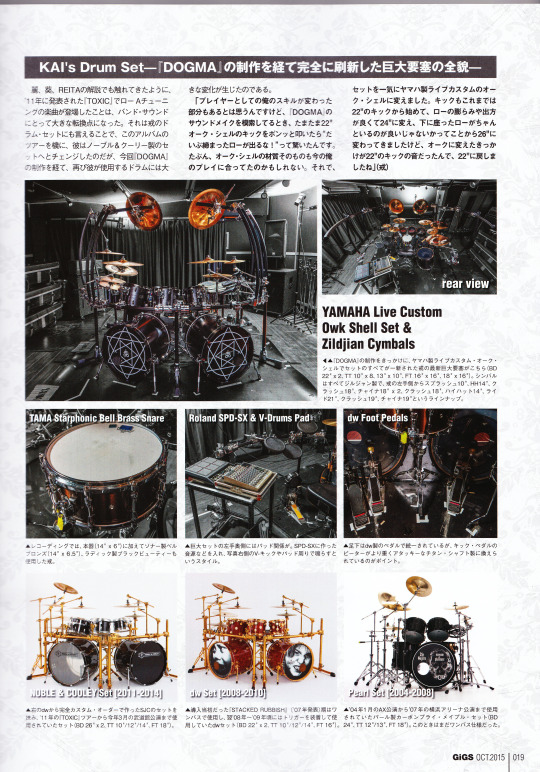
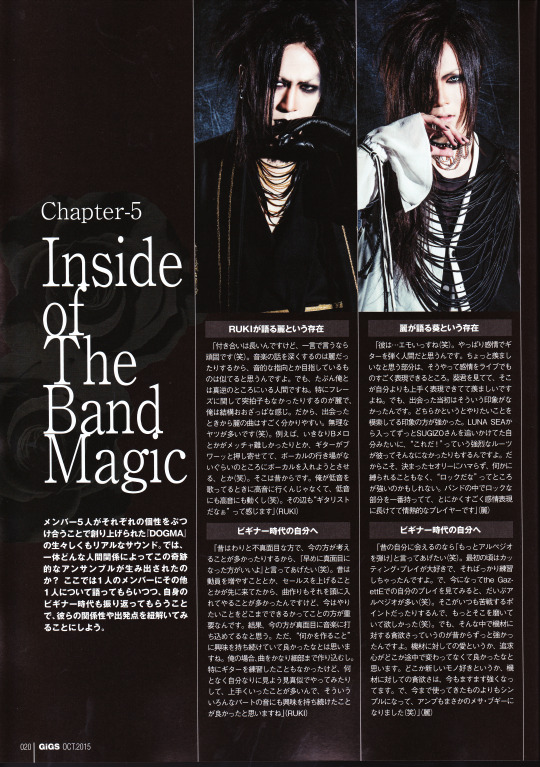
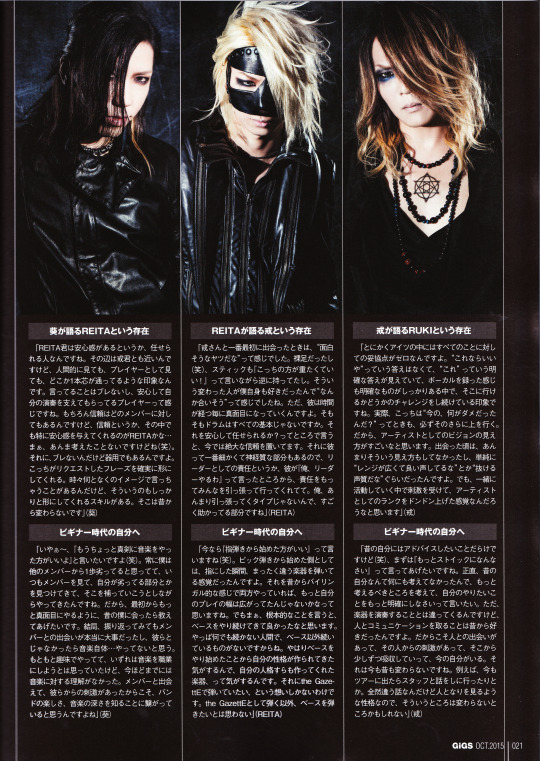
Chapter 5 - Inside of The Band Magic
The raw and real sound of DOGMA was created through the clashing and blending of the unique personalities of The GazettE's five members. What kind of relationships made this miraculous ensemble possible? In this chapter, we have each member talk about one of the others while also reflecting on their early days. Through this, we aim to unravel their relationships and their starting points.
RUKI on Uruha
“Our relationship goes back a long way, but if I had to sum him up in one word, he’s stubborn (laughs). When it comes to in-depth discussions about music, Uruha is usually the one I talk to. I think our musical inclinations and goals are similar, but he’s probably the complete opposite of me in many ways.
Especially with his phrasing—Uruha’s ideas are often experimental, while I tend to be more rough and ready. So, from the moment we met, his songs were always very distinctive. A lot of them were also… difficult (laughs). For example, suddenly throwing in a really challenging B melody, or having the guitar surge forward so much that the vocals barely have room to fit in. And then he expects me to make it work somehow (laughs). That’s something that hasn’t changed since back then.
Even when I’m singing in a low register, he’ll have me shift to both lower and higher tones. In moments like that, I really feel, ‘This guy is such a guitarist...’”
To my beginner self (Ruki):
“I used to be pretty laid-back, so I’d tell my younger self, ‘Start taking things seriously sooner’ (laughs). Back then, I was more focused on increasing our audience or boosting sales, so I often made music with that in mind. Now, what matters most is how far we can go with what we want to do.
As a result, I feel like I’m more dedicated to music now than ever before. At the same time, I’m glad I’ve always stayed interested in creating something. I’m the kind of person who likes to get deep into the details of a song. Even though I never formally practiced guitar, I often tried to figure things out by watching others or experimenting on my own. Those experiences taught me a lot, and I’m glad I kept exploring all the different elements of sound.”
Uruha on Aoi
“He’s… very emotional (laughs). I think he’s someone who plays guitar with his feelings. I honestly envy his ability to express so much emotion, especially during live performances. Watching him, I feel he’s better at expressing himself than I am, and that’s something I admire.
But that wasn’t my impression when we first met. Back then, he seemed more like someone who was still figuring out what he wanted to do. Unlike me, who had this strong, ‘This is it!’ moment from my LUNA SEA roots and obsession with Sugizo, Aoi didn’t seem to have one defining influence.
Because of that, he’s not bound by any particular rules or conventions, which might make him more ‘rock’ in a way. Among the band members, he has the strongest rock spirit. Overall, he’s an incredibly emotional and passionate player.”
To my beginner self (Uruha):
“If I could meet my younger self, I’d say, ‘Practice your arpeggios more!’ (laughs). Early on, I loved cutting-style guitar playing and practiced that nonstop. But looking at my parts in The GazettE now, there are so many arpeggios (laughs). That’s always been a challenging area for me, and I wish I’d worked on it more back then.
On the other hand, I’ve always had a strong curiosity about gear, and I’m glad that hasn’t changed. My love and passion for equipment have only grown stronger over time. I’ve also started simplifying things—I’ve even switched to a Mesa Boogie amp (laughs).”
Aoi on Reita
"REITA gives a sense of reassurance; he’s someone you can rely on. In that sense, he’s similar to Kai. As a person and as a player, he gives the impression of someone with a strong core. He’s consistent in what he says, and I always feel secure knowing my performance is supported by him. Of course, I trust all the members, but REITA is the one who gives me the most peace of mind... Well, I haven’t really thought about it much (laughs).
At the same time, while he’s steadfast, he’s also very skilled. If I request a specific phrase, he always brings it to life. Sometimes I just give a vague idea, and he still manages to shape it into something tangible. That skill has been a constant since the early days.”
To my beginner self (Aoi):
“Oh man, I’d definitely tell myself, 'You should take music more seriously’ (laughs). I’ve always felt like I was a step behind the other members. I’d watch them, figure out where I was lacking, and work on improving those areas. If I could meet my younger self, I’d tell him to be more serious from the start.
Looking back, meeting the other members was such a pivotal moment. If it weren’t for them, I don’t think I’d even be doing music. I originally started music as a hobby and thought I might turn it into a career someday, but I didn’t understand it as deeply as I do now. The inspiration and stimulation I’ve gotten from them have shown me the joy of being in a band and the depth of music.”
REITA on Kai
"When I first met Kai, I thought, 'He seems like an interesting guy.’ He was barefoot (laughs) and held his drumsticks the opposite way, saying, 'This feels heavier, so it’s better!’ I’ve always liked quirky people, so I thought we might get along. But as time went by, he became increasingly serious.
Drums are the foundation of everything, aren’t they? Whether you can fully trust someone to handle that responsibility is crucial, and I now place absolute trust in him. Kai’s also the most meticulous and detail-oriented among us. When he decided to take on the role of leader, he really took responsibility and started guiding everyone. Since I’m not the type to lead, I’m super grateful for that."
To my beginner self (REITA):
"I’d tell myself, 'Start with fingerpicking.’ Coming from a pick-playing background, switching to fingerpicking felt like learning a completely different instrument. If I’d been doing both from the start, I think my range as a player would’ve been broader.
That said, at the core, I feel glad I stuck with playing bass. I’ve never been someone who sticks to things for long, and bass is the only thing I’ve kept doing. It feels like picking up the bass shaped my personality and even my identity. It’s more than just an instrument; it’s part of who I am. And honestly, I only want to play bass as part of The GazettE. Outside of that, I don’t feel any desire to play."
Kai on RUKI
"RUKI doesn’t compromise on anything. There’s no ‘This is good enough’ for him; He always has a clear vision of what he wants, and when he records vocals, he knows exactly what he’s aiming for. He keeps challenging himself to reach that level, which is really impressive.
There are times when I think, ‘What was wrong with that take?’ but RUKI always has a reason—he’s striving for something even better. His ability to envision his art is truly remarkable. When we first met, I just thought he had a wide vocal range and a great voice. But as we worked together, I saw him grow rapidly as an artist, constantly raising the bar for himself."
To my beginner self (Kai):
"There’s so much I’d want to tell my younger self (laughs). First and foremost, I’d say, ‘Be more disciplined!’ Honestly, I didn’t think about much back then. I’d tell myself to focus more on what matters and to clarify my goals.
That said, one thing I’ve always enjoyed—then and now—is interacting with people. Meeting others and learning from them has been a constant in my life. That’s how I’ve grown—absorbing what I can from those around me. That hasn’t changed. Even now, on tours, I enjoy chatting with staff and getting to know them. While it’s not directly related to playing an instrument, building relationships and learning from others has been a consistent part of who I am."
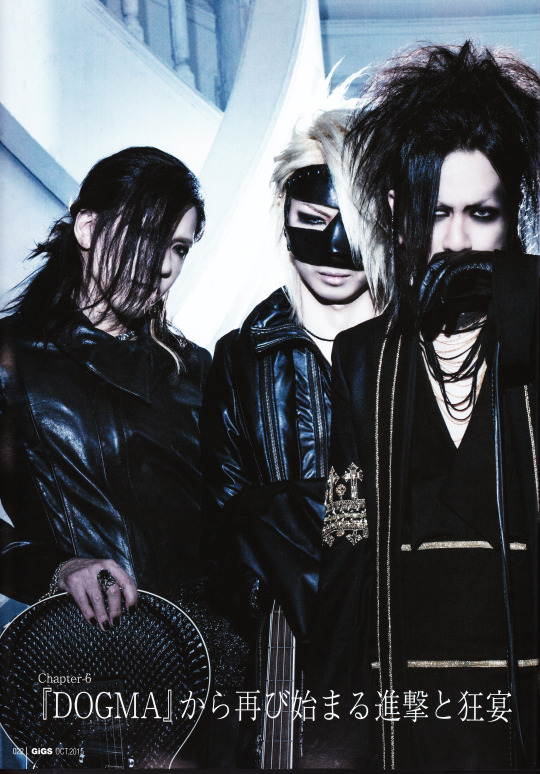
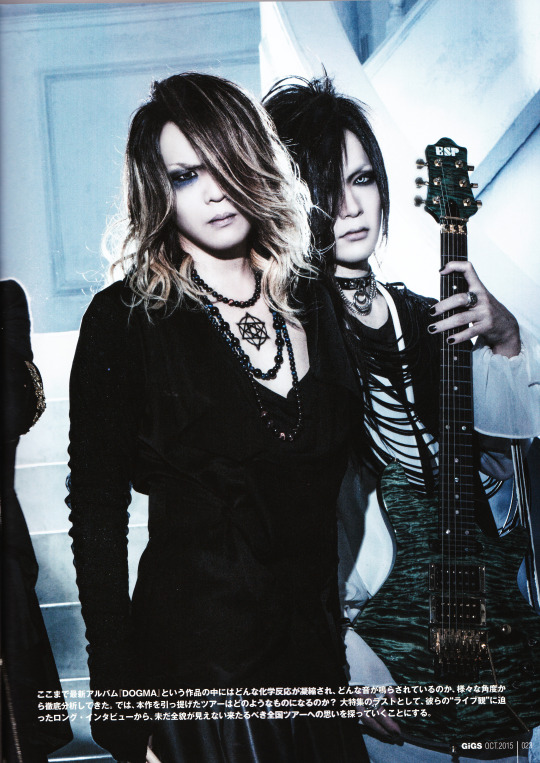
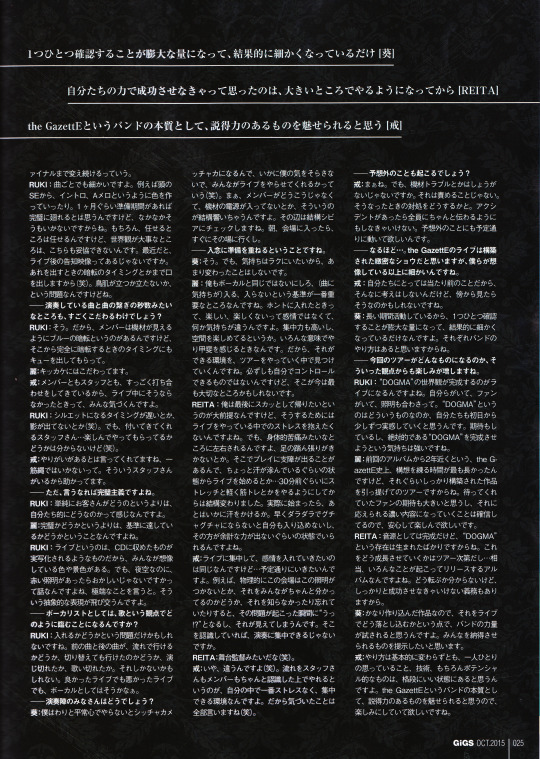
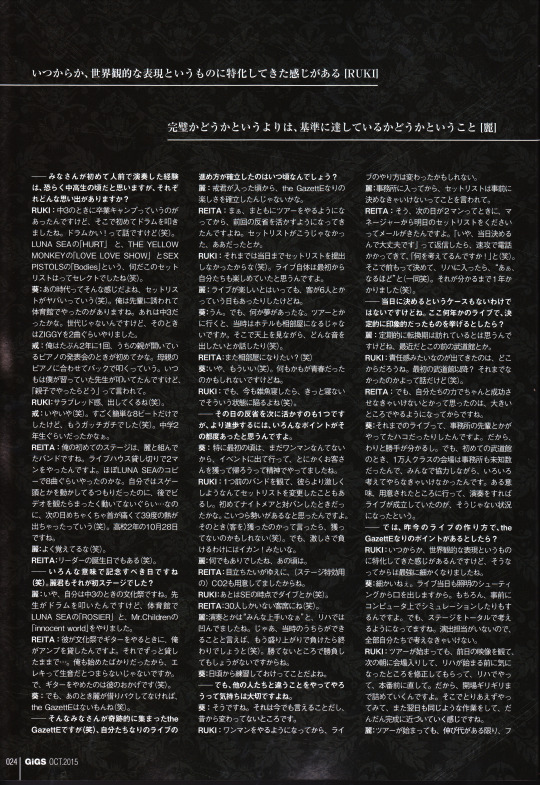
Chapter 6 - The Resurgence and Frenzy Beginning Again with DOGMA
So far, we’ve thoroughly analyzed the chemical reactions and sounds condensed into the latest album, “DOGMA,” from various perspectives. But what will the tour accompanying this work look like? In this in-depth feature, we explore their thoughts on live performances in a long interview, aiming to uncover their sentiments toward the upcoming nationwide tour, the full scope of which is still unknown.
"At some point, we started focusing on expressing a cohesive world view." - Ruki
"It’s not so much about whether it’s perfect, but whether it meets the standard." - Uruha
"We’ve been active for a long time, so the amount of things we need to check has grown to an immense level over time. As a result, it’s become more intricate." - Aoi
"The feeling that we had to succeed on our own really hit when we started performing at larger venues." - Reita
"As the essence of what the GazettE is, we aim to present something truly convincing and powerful." - Kai
Interviewer: Everyone’s first time performing in front of an audience was likely during your middle or high school days. What kind of memories do you have of that experience?
RUKI: It was during a graduation camp in my third year of middle school. That was the first time I played drums. Yes, drums! (laughs) Quite a surprise, right? (laughs). I played HURT by LUNA SEA, LOVE LOVE SHOW by THE YELLOW MONKEY, and Bodies by the SEX PISTOLS. It was such a bizarre setlist (laughs).
Aoi: That era had a lot of wild setlists like that (laughs). For me, I was invited by an upperclassman to perform in the school gym. I think I was in my third year of middle school too. We weren’t exactly of the generation, but we played two ZIGGY songs.
Kai: I think my first time was at a piano recital my parents organized every two years. My mother played piano while I accompanied on drums. Normally, my teacher would play the drums, but they suggested, “Why not do it as a parent-child duo?”
RUKI: That’s giving major prodigy vibes (laughs).
Kai: No, no, nothing like that (laughs). It was just a very simple 8-beat pattern, but I was totally stiff from nerves (laughs). I think I was in my second year of middle school.
REITA: My first performance was with a band I was in with Uruha. We rented out a live house and did a two-band show. We played about eight songs, mostly LUNA SEA covers. I thought I was moving my head a lot during the performance, but when I watched the video later, I was barely moving (laughs). Despite that, my neck hurt like crazy the next day, and I came down with a 39°C fever (laughs). It was October 28th of my second year of high school.
Uruha: You remember the exact date? (laughs).
REITA: It’s also the band leader’s birthday (laughs).
Interviewer: It sounds like that day was memorable in many ways (laughs). Was that also Uruha’s first stage?
Uruha: No, my first was during my middle school culture festival. A teacher played the drums, and we performed LUNA SEA’s “ROSIER” and Mr.Children’s “innocent world” in the gym.
REITA: When he was preparing to play guitar for the cultural festival, I lent him my amp. And then he ended up holding onto it for ages… At that time, I had just started playing too, and you know, electric guitar without an amp isn't very fun. So because of him, I quit playing guitar (laughs).
Aoi: But if Uruha hadn’t stolen that amp back then, there would be no GazettE (laughs).
Interviewer: It’s remarkable how all of you came together in the GazettE (laughs). When did you establish your current approach to live performances?
Uruha: I think it was after Kai joined that we solidified what made the GazettE's shows fun.
REITA: Yeah, once we began doing proper tours, we started reflecting on the previous shows and learning from them. Things like, “That setlist didn’t work,” or “This part could’ve been better.”
RUKI: Before that, we wouldn’t even finalize the setlist until the day of the show (laughs). But even from the beginning, I think we always managed to enjoy the performances ourselves.
Uruha: Even though live shows were fun, there were days when we only had six people in the audience.
Aoi: Yeah, but we had dreams. When we went on tours, we’d share hotel rooms, right? We’d lie on our backs staring at the ceiling, talking about what kind of music we wanted to create (laughs).
REITA: Do you want to go back to sharing rooms? (laughs)
Aoi: Nah, I’m good (laughs). Maybe those days were just all part of our youth.
RUKI: But even now, if we all slept in the same room, we’d probably end up talking all night, about the same kind of stuff (laughs).
Interviewer: Reflecting on each show and applying that to the next one is important, but there must have been specific turning points that helped you all improve further along the way.
Aoi: Especially in the beginning, since we didn’t have solo gigs yet, we’d participate in events with this mindset of, “Let’s win over the audience.”
RUKI: There were times when we’d watch the band before us and decide on the spot to make our setlist more intense. I think that happened the first time we played a show with Nightmare. I remember thinking, “Wow, these guys have so much energy.” Did we win over the crowd that time? Maybe not (laughs). But we weren’t about to lose in terms of intensity!
Uruha: Back then, anything went.
REITA: We even had CO2 effects (stage pyrotechnics) because we just wanted to stand out.
RUKI: We’d start diving into the audience during the intro SE (laughs).
REITA: Into a crowd of 30 people (laughs).
Uruha: When it came to rehearsals, I’d often feel disheartened, thinking, “Wow, everyone else plays so well.” So at that point, the only thing we could do was focus on not losing in terms of energy and excitement (laughs). There was no point in competing in areas where we couldn’t win.
Aoi: That just means you’ve got to practice more on a daily basis.
Interviewer: Still, having that mindset of wanting to do something different from everyone else is important, isn’t it?
Aoi: Definitely. That’s something that’s still true for us, and it hasn’t changed since back then.
RUKI: I think our approach to live performances changed once we started doing one-man shows.
Uruha: When we joined our agency, they told us we needed to finalize the setlist in advance.
REITA: Right, there was this one time before a two-band show when the manager emailed us, asking for the setlist. I replied, “Don’t worry, we’ll decide it on the day,” and immediately got a phone call. The manager was like, “What are you even thinking?!” (laughs). When we finally started deciding the setlist ahead of time and then rehearsed it, we were like, “Ohhh, this makes sense” (everyone laughs). It took us about a year to figure that out (laughs).
Interviewer: Deciding on the day isn’t entirely unheard of, but looking back, were there any particularly memorable performances in recent years?
Uruha: I feel like turning points come to us periodically. Recently, it would have to be our show at Budokan.
RUKI: I wonder when we started to feel a sense of responsibility. Maybe after the first Budokan show? Not that we didn’t have any before that (laughs).
REITA: The realization that we had to succeed through our own abilities really came when we started playing in larger venues.
Aoi: Before that, our shows were often at venues where senior bands from our agency had performed, so we had a pretty good idea of how things worked. But when we first played Budokan, a venue that holds around 10,000 people, it was uncharted territory even for our agency. We had to collaborate and think things through carefully. In a way, up until then, we could simply show up to a pre-prepared venue, play our set, and the show would come together. But that dynamic changed. In a way, we’d been able to just show up, play, and the live would work. But that was no longer the case.
Interviewer: In terms of your recent approach to creating live shows, what would you say is unique to the GazettE’s style?
RUKI: At some point, we started focusing on expressing a cohesive world view. Since then, everything has become insanely detailed.
Aoi: Yeah, it’s super detailed. Even on the day of the show, we’ll weigh in on things like lighting adjustments. Of course, we also use simulations on computers beforehand. But now, we think of the entire stage as a unified production. Since we don’t have a director for staging, we have to handle everything ourselves.
RUKI: Even after the tour starts, we watch footage from the previous night, head to the venue early the next morning, and make adjustments to anything that caught our attention before rehearsals begin. We test those changes during rehearsal, tweak them again before the show, and work right up until just before the doors open. It’s a process of constantly refining things—trying them out, then repeating the same process the next day. Little by little, it gets closer to what we want.
Uruha: Even after the tour starts, as long as there’s room for improvement, there’s a massive amount of things to check, which inevitably makes everything more detailed. We keep making changes all the way up to the final show.
RUKI: We’re particular even with individual songs. For example, from the opening SE, the intro, and into the verse, we create a mood, layer by layer. If we had about a month to prepare, I think we could do everything perfectly, but that’s not usually the case. Of course, we delegate where we can, but when it comes to elements critical to the overall atmosphere, there’s no room for compromise. Recently, there’s the matter of those post-show announcement videos, right? We even get involved in things like the timing of the blackout before those play (laughs). It’s all about whether it gives us goosebumps or not—that’s the deciding factor.
Interviewer: You’re also very particular about details like the number of seconds between songs during a performance, right?
RUKI: Right. So for example, there’s a blue blackout where the members can still see their equipment, but even for the moment when it shifts to complete darkness, we’ll have the crew cue it precisely.
Uruha: We’re very particular about the timing of those cues.
Kai: We have so many discussions with both the band members and the staff that when something doesn’t go as planned during a show, everyone notices.
RUKI: Like if the timing for creating a silhouette is off or the shadow doesn’t appear properly (laughs). But we’re lucky to have a staff that keeps up with all this… Whether they enjoy it or not, I can’t say (laughs).
Kai: They’ve said it’s rewarding, even though it’s not easy. We’re really grateful to have such dedicated staff.
Interviewer: That level of detail could be described as perfectionism, wouldn’t you say?
RUKI: It’s less about what the audience thinks and more about whether it feels right to us.
Uruha: It’s less about being perfect and more about meeting our standards.
RUKI: A live show is like a live-action version of what’s on a CD. Everyone has an image of the colors and scenery they imagine when they listen to the music. If it’s supposed to feel like a night sky, but you have red lights, that doesn’t make sense. It’s that kind of abstract balance we’re always working with.
Interviewer: As a vocalist, what’s your approach to these live performances?
RUKI: It’s about whether I can immerse myself in it. Whether the transition from the previous song to the next flows naturally, whether I can switch seamlessly, whether I can fully embody and perform the song, and whether I can sing it completely. That’s all it comes down to for me, whether the live went well or not.
Interviewer: How about the instrumental members?
Aoi: I need to stay calm; otherwise, things get completely chaotic for me. It’s about how much everyone helps me stay focused during the live performance (laughs). It’s not about the members—it’s more about technical issues, like equipment power not being on. Those things really affect me, so I check those details pretty rigorously. The moment I arrive at the venue in the morning, I head straight to my gear to make sure everything’s in order.
Interviewer: So thorough preparation is key.
Aoi: Definitely. But I also want to keep things mentally light, so I try not to change too much from my usual routine.
Uruha: I’m somewhat similar to RUKI in that my focus is whether I can fully immerse myself in the music. When I’m fully in it, it’s not about whether I’m having fun or not—it’s more that my feelings are on a completely different level. My concentration is higher, and I feel like I’m truly experiencing the zone. Those are the moments when I feel a real sense of fulfillment. During a tour, it’s about discovering an environment that allows for that kind of immersion. It’s not something I can always control myself, but right now, that’s what I value most.
REITA: For me, the ultimate goal is to walk away feeling refreshed, but to get there, I want to avoid any stress during the performance. Physical discomfort tends to have the biggest impact—things like not being able to plant my feet properly can throw me off. To address that, I started warming up about 30 minutes before the show—stretching and light muscle training. It’s made a big difference. Once the performance starts, it’s all about how much I can sweat. If I don’t get drenched and completely messy early on, I can’t fully immerse myself. Being in that state keeps me from overexerting myself unnecessarily.
Kai: Like everyone else, I want to fully focus on the performance and channel my emotions into it. But at the same time, I want things to go as planned. For instance, if there’s a venue where certain lighting isn’t available, I need to know that everyone—both the staff and the band members—understands this limitation. If someone doesn’t know or forgets, the moment something unexpected happens, it’s like, “Whoa, what just happened!?” That moment of confusion becomes visible. If everyone’s on the same page, I can focus entirely on the performance.
REITA: You sound like a stage manager (laughs).
Kai: No, no, it’s not like that (laughs). But when the flow of the show is clearly recognized by everyone—staff and band alike—that’s when I can feel the least stressed and the most focused. That’s why I speak up about anything I notice (laughs).
Interviewer: But unexpected things still happen, don’t they?
Kai: Sure, they do. But things like equipment trouble, you can’t really help that. It’s not something to blame anyone for. The important part is how we respond when it happens. We also have to make sure that any accidents are communicated clearly to everyone. Even when something unexpected happens, we want things to proceed as smoothly as planned.
Interviewer: I see... The GazettE’s live shows feel like intricately crafted spectacles. But it sounds like they’re even more detailed than we might imagine.
Kai: To us, this level of detail feels normal, so we don’t really think about it. But maybe it seems that way to others.
Aoi: We’ve been active for a long time, so the amount of things we need to check has grown to an immense level over time. As a result, it’s become more intricate. But every band has its own way of doing things.
Interviewer: This tour sounds like it’s going to be something truly special, even from this perspective.
RUKI: The worldview of DOGMA will only fully come together during the live performances. With us, the fans, and the lighting all coming together, that’s when the true essence of DOGMA emerges. I think we’ll start to feel what DOGMA really is little by little from the first day. I’m excited about it, and we’re very determined to bring this absolute of DOGMA to completion.
Uruha: This time, we had nearly two years of preparation since the last album, the longest planning period in The GazettE’s history. It’s a meticulously constructed work that we’re bringing on tour. The fans who’ve been waiting for us have high expectations, and I’m confident that the tour will be rich and fulfilling enough to meet those expectations. I want them to enjoy it without any worries.
REITA: The album itself is complete, but the entity of DOGMA has just been born. How it grows will depend on the tour. This album was created under intense circumstances, with so many things happening during its production. We don’t know how it will evolve, but we feel a strong obligation to make it a success.
Aoi: It’s such a well-constructed work that I think our abilities as a band will be put to the test in how we translate it into a live performance. We’re determined to present something that everyone will be satisfied with.
Kai: While our approach hasn’t fundamentally changed, I feel that what each of us brings—our ideas, skills, and overall potential—is at its highest level ever. As the essence of what the GazettE is, we aim to present something truly convincing and powerful. I want everyone to look forward to that.
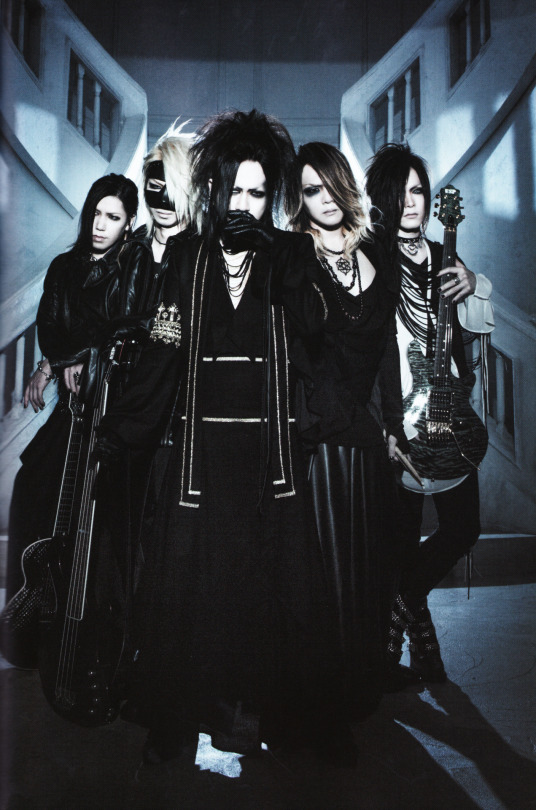
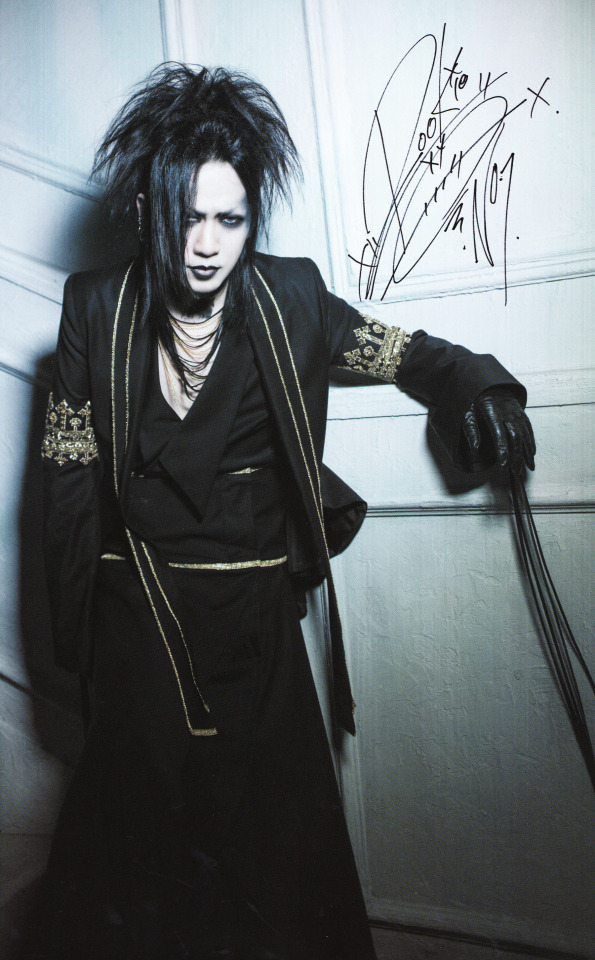
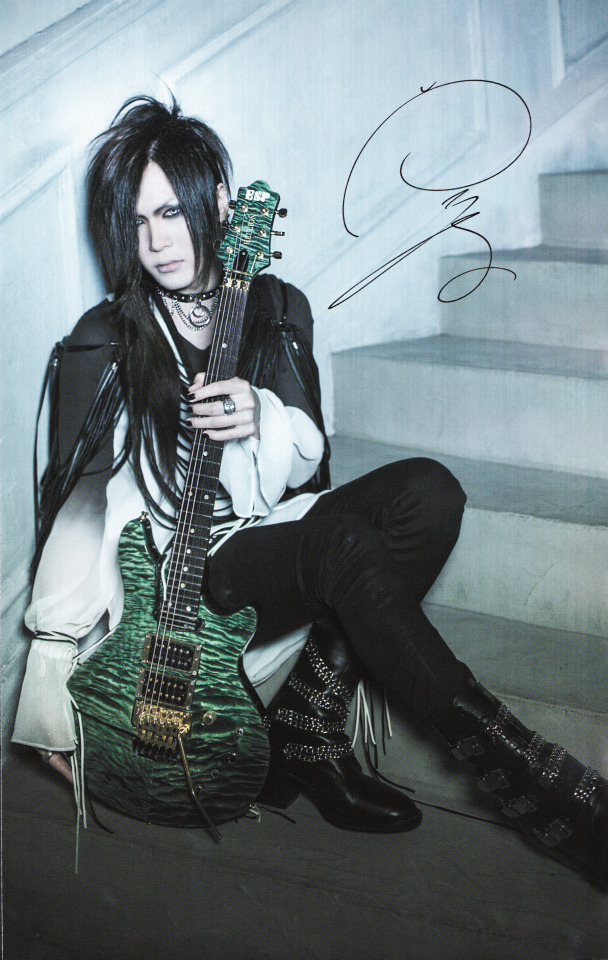
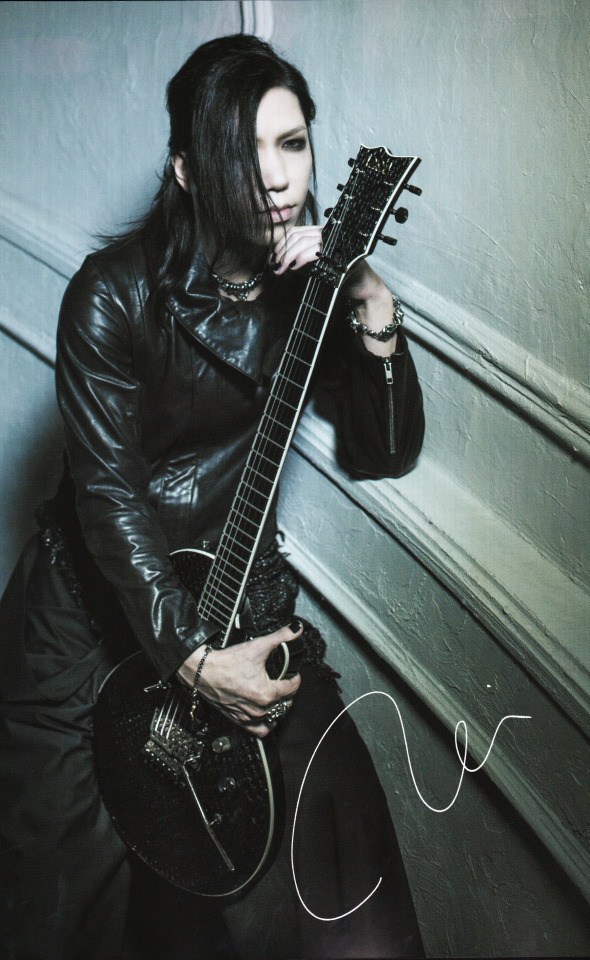
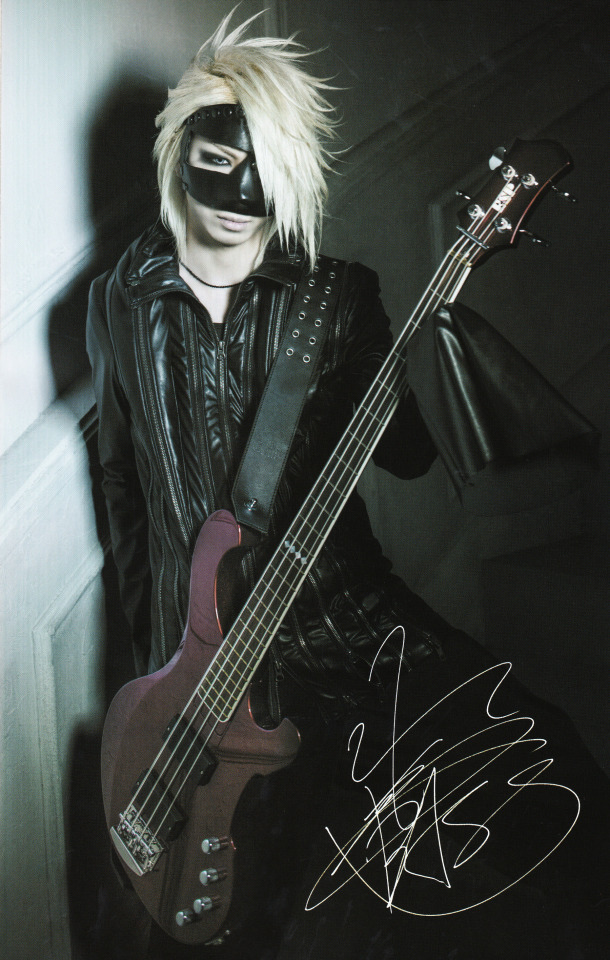
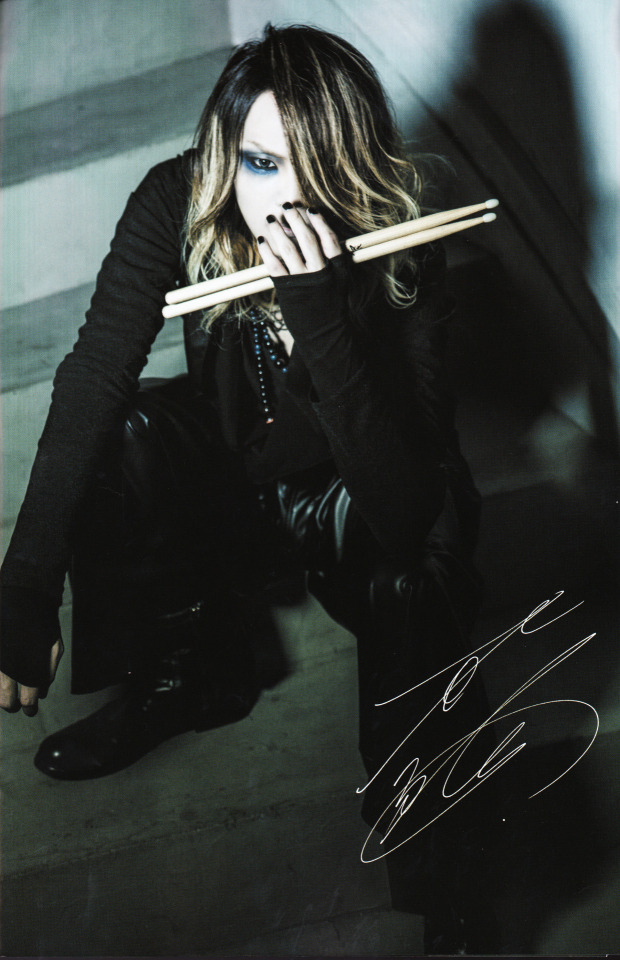
Scans cr: Kyoselflove Translation: ChatGPT
#this isnt the 1 i quoted few days ago btw. and it prob wont be the next 1 i post either...#but i ll get to it.. before the year ends i guess?#the gazette#interview translations#gigs#scans#magazines#dogmatic#mi#uruha not mentioning sugizo in an interview challenge (impossible)
29 notes
·
View notes
Text

Wildest Dreamings
Chapter 3: Studying Strife
Elphaba doesn't want to dance through life, she just wants to read.
1 | 2
READ ON AO3
Elphaba Thropp woke to the sound of her roommate squealing like a lunatic. This was not the first time Galinda’s high-pitched hullabaloo had interrupted her slumber, but she had yet to find a way to tune it out.
She sat up in bed and watched through groggy eyes as Galinda flitted around the room, feverishly primping as if her life depended on it. The obnoxious squeak of her perfume bottle was too much for Elphaba to bear this early in the morning, so she laid back down, using her pillow as a soft shield.
She’d slept poorly the night before, her mind restless with worry over Dr. Dillamond’s warnings of unrest. That arrogant, unfunny man from the forest was also plaguing her thoughts, but she tried not to dwell on the recklessness of traveling imbeciles.
Galinda finally burst out of their room, clearly on a mission, so Elphaba emerged from the safety of her humble alcove. She changed out of her nightgown and into her favorite pinafore and blouse, carrying on with her braided high ponytail from the day before. Her safety might have been compromised during that near-trampling, but at least her hair had kept its composure.
Elphaba emerged from the dormitory, readying herself for the typical stares and sneers, but as she made her way across campus, she noticed something strange. The student body whispered and giggled as they normally did, just not at her. She couldn’t surmise the subject of their jabber, nor did she care to, but it was surprising to go unnoticed for once.
Many students were clutching that day’s edition of the Shiz Gazette, devouring the headlines as if they were starving for something buzzworthy. Elphaba had yet to read anything in that publication worthy of such excitement, preferring her actual textbooks to tedious reports of collegiate gossip.
It was her affection for actual books that brought Elphaba to the library, one of her few places of solace at the university. She’d always found comfort amongst their modest shelves at home, but something about this circular collection of the rare and ancient made Elphaba feel more powerful by association. The library reminded her that she’d earned her right to study at Shiz, and she refused to squander it.
She spotted Nessarose at one of the study tables and sat beside her, arranging her supplies as they exchanged pleasantries. She’d been trying to maintain a healthy distance from Nessa to support her independence, but every once in a while she craved that fleeting sisterly connection.
“I met the rudest person last night,” Elphaba whispered to her sister, figuring a tiny bit of gossip couldn’t hurt.
“Uh-huh,” Nessa responded, seemingly preoccupied with her studying. Elphaba leaned over to see what had captured her attention, spotting a copy of the newspaper wedged between the pages of her textbook.
“Oh Nessa, not you too! What could possibly have happened that has everyone so afflicted?”
Nessarose gasped and her eyes went wide. “Have you not heard? A prince just arrived on campus!”
This piqued Elphaba’s interest more than she cared for. “A prince? Why? Is he here to cut a ribbon or something?”
“No Elphaba, he just arrived as a student.”
Elphaba couldn’t imagine what an Ozian prince of any kind would be doing at a university like Shiz. Weren’t their lives preordained without any need for legitimate skills or knowledge?
“Well, best of luck to him. I doubt he’ll last very long.”
She didn’t have time to worry about a prince when The Complete Alchemist was calling to her. Madame Morrible had assigned the reading for her sorcery seminar, and Elphaba was enchanted by the history of magical genesis. It was unlike anything she’d ever been allowed to learn before, and she took vigilant notes.
“And this is the, um… book place!”
Elphaba looked up at the sound of a most familiar chirp, and saw her roommate escorting a young man into the library. Galinda was rambling to him, something about medium-rare books that sounded like nervous, flirtatious nonsense. Who could have the Galinda Upland in such a tizzy?
It wasn’t until Galinda tossed her hair and stepped away from her suitor that Elphaba got a good look at him. Tousled hair streaked with honey, broad shoulders covered in navy velvet, and sky-blue eyes clouded by smugness. To her horror, her moonlit assailant had returned in broad daylight – and he was waving at her, smiling like he’d just run into an old friend.
Elphaba met his greeting with the most dismissive eye roll she could muster, and returned to her notes. She tried her hardest to focus on reading, but the new boy was determined to make his presence impossible to ignore.
That Munchkin boy, Boq, literally fell over himself trying to overhear Galinda’s conversation with him, and Elphaba was embarrassed on Boq’s behalf. She figured if one is to eavesdrop, they must at least pretend to be disinterested, though Elphaba’s own nonchalance still needed work.
She listened as her mystery trampler finally introduced himself to her classmate. “I’m Fiyero Tigelaar,” he turned to Galinda, “of Winkie Country.” She swooned, and it dawned on Elphaba that this Fiyero must be the student prince everyone was talking about.
The scoundrel prince and her sickly sweet roommate – they deserve each other. They’ll torment me as a pair, Elphaba thought.
She watched on, nonchalance be damned, as Fiyero threw his arms around Galinda and Boq. “I see that once again that the responsibility to corrupt my fellow students falls to me.” Elphaba shuddered to think of the delinquency he might encouragerize.
His first of many crimes was the ruthless chucking of an innocent book. It landed with a thud as he cartwheeled into a spiel about his flunking out of multiple schools. He seemed to be proud of such failures, which Elphaba found absurd.
“They want you to become less callow, less… shallow?” he explained, eliciting another eye roll from the green girl. “But I say, why invite stress in?”
The librarian, Oz bless her, attempted to restore order with a stern shush, but he disarmed her with a twirl and a kiss, lifting her tenderly onto a book cart. He sent her rolling away along with any authority she might have over him, and the crowd of students applauded. Elphaba felt nauseous.
Fiyero continued on with his half-witted soliloquy on the merits of a meritless existence, gyrating around the library with his flock admiring each step he took on the covers of helpless tomes. Out of the corner of her eye, Elphaba could see that Nessarose was just as enamored with this mindless spectacle as the rest of their peers, and she could not hide her disdain.
The prince set his sights on the circular bookcase at the center of the room, the university’s rarest books preserved within its rotating shelves. He activated its tornado wheel mechanics and made to leap inside, clearly not concerned with the endangerment of precious literature. Elphaba could no longer watch in silence.
“What do you think you’re doing?!” she yelled as she stood, actually hoping to redirect people’s attention for once. Instead, she faced a vexing chorus of shushes before they turned their gaze back to their new social captain. “Do you mind? Some of us are trying to learn something!” Galinda shot over her shoulder.
Fiyero swung into the tornado wheel, books flying as he vaulted about, spewing more of his anti-intellectualism. The more she listened to his speech, she found that there was something kind of pitiful about what he was suggesting, that somehow life could be less fraught if one simply stopped caring about anything of value. That couldn’t actually be a fulfilling way to live, so she wondered what had led this privileged prince to such an ignorant philosophy.
Realizing how distracted she had become, Elphaba needed to seek refuge in a quieter environment. “I’m gonna go study outside, I can’t listen to this,” she said to Nessarose.
She gathered her things and quickly made her way towards the exit, hoping to slip out without getting caught up in the foolery. Fiyero and his merry band were making plans to go down to some illicit ballroom that evening, which sounded just as distasteful as people dancing in a library.
As she ran off, she didn’t notice the prince watching her. He had a momentary, intrusive idea to try to give the green girl a whirl, but then he got distracted by the blonde one.
Elphaba found safety out in the courtyard, but she could still hear a muffled manifesto coming from the library. It was only after she saw the crowd file out in a flurry that she dared return to try to rescue and rehome any victimized books.
Just as she finished, she saw Nessarose making her way over, beaming. “You’ll never guess what just happened!” After that morning’s surprises, very little could shock her. “What?”
“That perfectly adorable Munchkin boy just asked me out! He said he was too shy to ask me, at first, but then Galinda emboldened him,” Nessa explained, clearly giddy.
“Wait, Galinda?” Anything orchestrated by Miss Upland made Elphaba feel wary, and Nessa knew how little she trusted her roommate.
“Don’t! Don’t you dare say another word against her. I’m about to have the happiest night of my life, thanks to Galinda.”
Nessa went on, pleading with her sister to see how important this night was to her, how fate had brought her and Boq together, and how Galinda’s kindness shouldn’t be overlooked.
“Please, Elphaba, try to understand.”
Elphaba took her baby sister’s hand, not nearly as little as it used to be. She knew that Nessa was old enough to make her own choices, and she refused to be like their father, infantilizing and paranoid. Her sister’s happiness, no matter how temporary it may be, mattered more than her own fears.
“I do.”
Wildest Dreamings is Part One of The Land of What-Might-Have-Been, a two-part narrative revealing the complete love story of Elphaba Thropp and Fiyero Tigelaar.
#wicked#wicked 2024#wicked musical#wicked fanfiction#elphaba thropp#fiyero tigelaar#fiyero x elphaba#fiyeraba#fiyeraba fic
16 notes
·
View notes